- Learn English
- Infographics

- English Vocabulary

100 + Travel Words explained 🛫🏝❤️ Best Free Lesson

You can jump to any section of this article:
Booking a Holiday
Travelling to your destination, arriving at your destination, places to visit, describing places, asking for help.
Whether you are going on a short holiday for a few days or planning to travel around various countries for a few months, having a basic understanding of the vocabulary and phrases you might need to use for communication is quite important.
English is a widely spoken language in the majority of countries that welcome tourism, so it would be beneficial to familiarise yourself with some useful phrases before departing.
In addition, if you could find out how to say some basic phrases in the country’s native language, I’m sure the local people there would appreciate your efforts!
Basic phrases in English that you should translate and try to use in the native language of your destination:
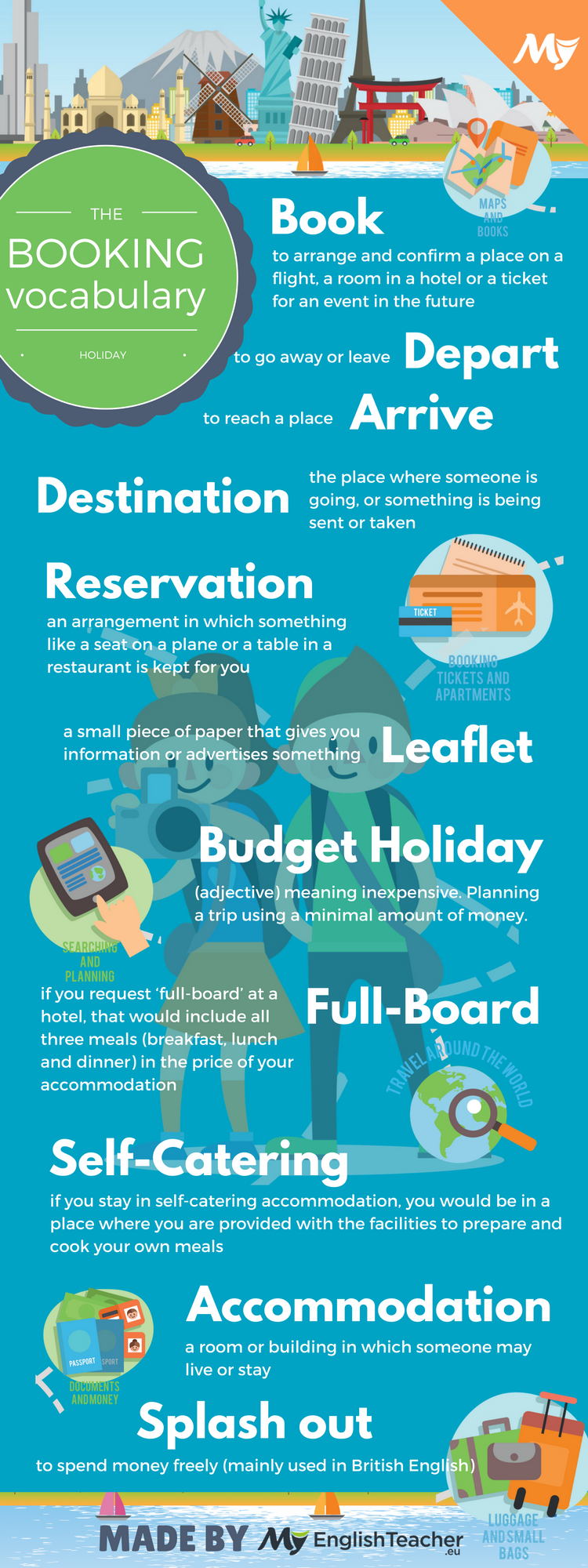
Book: as opposed to the noun (reading material), this verb means to arrange and confirm a place on a flight, a room in a hotel or a ticket for an event in the future.
Depart: to go away or leave, especially on a journey.
Arrive: to reach a place, especially at the end of a journey.
Reservation: an arrangement in which something like a seat on a plane or a table in a restaurant is kept for you.
Destination: the place where someone is going, or something is being sent or taken.
Complimentary: if tickets books or any other items are complimentary, it means they are given free, especially by a business.
All-Inclusive: Including everyone or everything. In holiday terms, this would refer to a hotel deal where the price usually includes accommodation, meals and drinks (any extra activities or facilities would be charged separately).
Travel Agency: a company or shop that makes travel arrangements for people.
Ticket: a small piece of paper or card given to someone, usually to show that they have paid for an event, journey or activity.
Brochure: a type of small magazine that contains pictures and information about a product or a company.
Leaflet: a small piece of paper that gives you information or advertises something.
Last Minute Deals: these are promotions that are advertised at the latest possible time for those who are more spontaneous!
Promotion: publicising a product to increase sales or public awareness.
Package Deal: an offer or agreement involving a number of related items or the acceptance of one being dependent on acceptance of another.
Half-Board: if you request ‘half-board’ at a hotel, breakfast and dinner would be included in the hotel price (as part of the package).
Full-Board: if you request ‘full-board’ at a hotel, that would include all three meals (breakfast, lunch and dinner) in the price of your accommodation.
Self-Catering: if you stay in self-catering accommodation, you would be in a place where you are provided with the facilities to prepare and cook your own meals.
Accommodation: a room or building in which someone may live or stay. Different types of accommodation include apartments, hotels, guesthouses and backpacking hostels.
Vacation: the American term for ‘holiday’.
Camping: the activity of spending a holiday (vacation) living in a tent or campervan.
Backpacking: to travel or hike carrying one’s belongings in a backpack.
Transfer: the act of moving someone or something from one place to another.
Budget Holiday: (adjective) meaning inexpensive. Planning a trip using a minimal amount of money. (Budget – noun) Having a limited amount of money for expenditure:
- ‘We have to keep within the household budget).
Travel Documents: all the necessary documents you would need to take with you on a holiday i.e. passport or ID card, driving license, flight/bus/ train tickets, visa confirmation etc.
Outbound: travelling away from a particular place, usually the first half of a journey.
Inbound: travelling towards a particular place, especially when returning to the original point of departure.
Two-way, Return Ticket (UK), Round Trip (US): a ticket that allows someone to travel to a place and back again.
One-way, Single Ticket: a ticket that allows a passenger to travel only to his/her destination, without returning.
Transport: (verb trans-PORT ) to take or carry goods or people from one place to another. (noun TRANS-port ) A system or means of conveying people or goods from place to place by means of a vehicle, aircraft or ship.
Splash out: a phrasal verb (mainly used in British English) meaning to spend money freely
Please enable JavaScript
Sample Conversation about Booking a Holiday: Travel Agent = TA, Customer = C
TA: Good afternoon madam, how can I help you today? C: Good afternoon, I would like to book a trip to Italy for 2 people and a 6 year old child please.
TA: Is there anywhere in particular you would like to go? C: I can’t decide between Venice or Rome, whichever is cheaper as we’re on a budget this year!
TA: Okay, and when would you like to go? C: We have two weeks of holiday between 18 th June and 2 nd July, and we’d like to go for at least 10 days during that period.
TA: No problem, I’ll just check to see which destination would be cheaper…. We have a special promotion on at the moment, if you book a package deal to Venice, you get free transfer to and from your hotel to the airport, plus one free meal each day. Would you be interested in that? C: Yes, that sounds great!
TA: And would you like full-board or half-board ? C: Well, seeing as we will get one free meal each anyway, I think self-catering would be better. I’ll have a little bit of extra money to splash out in a nice restaurant somewhere!
TA: Okay, that’s fine. We have a hotel that offers self-catering facilities and is right in the centre of Rome. They also have special facilities for children such as meal deals, extra beds, a play area in the lobby and a crèche. C: Perfect! I won’t need to spend too much money on transport and our son will surely have fun too!
TA: Exactly. Your outbound flight will be on the 19 th June, departing from London Gatwick Airport at 11:30am , and your return flight will be on the 30 th June at 10:30pm. That gives you 11 and a half days in Rome, does that suit you? C: Yes, that’s excellent, and we’ll still have a couple of days to recover before going back to work! How much will that be?
TA: Well, the promotion is £200 per adult, and your child can go for free because he is under 8 years old. That includes the return flights , accommodation for 11 nights, airport transfer and a complimentary meal each per day. Shall we go ahead and book it ? C: Wow, that is a fabulous deal! Yes please.
TA: Okay. How would you like to pay? C: Credit card please. Here you go.
TA: Thank you. Could I also see your passports please? C: Sure, here you go.
TA: Thank you. Here are your tickets and everything else you’ll need to know about your package holiday. Remember to keep all your travel documents safe throughout the whole trip. C: Thank you so much for your help!
TA: You’re welcome. Enjoy the rest of your day and please contact us if you have any queries before you set off on your holiday !
Recommended for you: Spa Fitness Gym Workout Massage Vocabulary and Dialogs Formal and Informal Email Phrases Starting with Greetings
NEXT: Packing Vocabulary
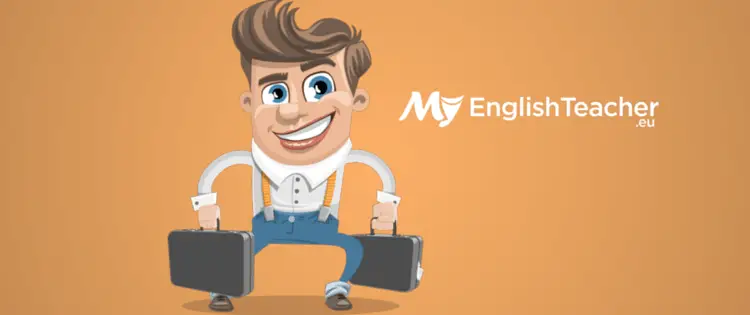
Suitcase: a case with a handle and hinged lid, used for carrying clothes and other personal possessions.
Backpack (US), Rucksack (UK): a bag with shoulder straps that allow it to be carried on one’s back.
Currency: a system of money in general use in a particular country.
Appropriate Clothing: suitable or fitting for a particular purpose, person or occasion.
Seasonal: relating to a particular season of the year (Autumn, Winter, Spring or Summer).
Swimwear, Bikini: clothing worn for swimming (bikinis are specifically for women).
Fanny Pack (US), Bum Bag (UK): a small bag used to safely store small valuable items when on holiday. This is usually worn around the waist and can be concealed under one’s clothing.
Sample Conversation about Packing:
A: Sarah, I’ve managed to book the flights and the train tickets for our vacation to Switzerland! B: Wow, that’s so exciting! So, are we leaving next month on the date we wanted?
A: No, we’re leaving next week! The travel agency gave us a great package deal and we’ve saved a lot of money, but it meant changing the dates to go earlier. We don’t have to work anyway, so I thought it would be nice! B: Oh, I see! Okay, that means we’ll have to start packing very soon. What will the weather be like?
A: Well, it’ll be spring but we’re going for 3 weeks, so I would say it’s safer to take clothing for hot and cold weather. We’ll probably go skiing too, so let’s pack our snow gear . B: Sure. I’m going to pack a few bikinis too, just in case we find a small beach!
A: It might be easier to take our backpacks , as we can fit more into them. B: I agree, they’re a lot bigger than the suitcases . Have you got all our travel documents together?
A: I just need to print off the flight confirmation details and the train tickets . B: Great. I’ll get some dollars exchanged to Swiss franc for the first few days. A: Okay, so you’re in charge of getting the currency sorted and I’ll keep all the travel documents together. Now, let’s start packing!
Recommended for you: Cooking / At the Restaurant Vocabulary and Dialogs Vacation vs Holiday in English! Travel, Trip, Journey, Tour, Voyage, Cruise, Crossing, Excursion, Expedition, Flight
NEXT: Traveling to your destination
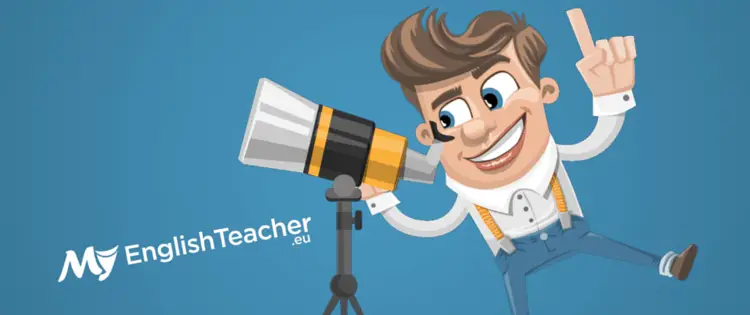
Check-In: the act of reporting one’s presence and registering, typically at an airport or hotel.
Departure Gate: gate where passengers embark.
Airport Terminal: this is a building at an airport, where passengers transfer between ground transportation and the facilities that allow them to board or disembark from an aircraft.
Departure Lounge: a seating area in an airport where passengers wait to board an aircraft or vehicle.
Duty-Free: Items available for purchase that are free of duty or tax charges in a particular country, generally sold at airports.
Ferry: a boat or ship for conveying passengers or goods, especially over a relatively short distance and as a regular service.
Take Off: (of an aircraft or bird) becoming airborne.
Board: to get on or into (a ship, aircraft or other vehicle).
Passport Check, Security Checkpoint: a barrier or manned entrance typically at a border of a country where travellers are subject to security checks.
Overweight: baggage weighing in excess of the allowed amount.
Destination: the place to which someone or something is going or being sent.
Window Seat: a seat positioned next to a window on a large vehicle or aircraft.
Aisle Seat : a seat positioned beside the walkway on a large vehicle or aircraft.
Sample Conversation about Checking-in at the Airport: Airport Attendant = AA, Passenger = P
AA: Next please! P: Hi. Good Afternoon.
AA: Good Afternoon sir. May I see your passport please? P: Yes, here you go.
AA: Thank you. Please place your luggage on the belt. P: (Places suitcase on the conveyor belt)
AA: I’m afraid this suitcase is 7kg overweight . You are allowed a maximum of 30kg and this suitcase weighs 37kg. You will need to remove some items or pay an additional fee for the extra weight. P: Oh no! I see. Okay, I’m happy to pay the fee.
AA: Is this your bag sir? P: Yes, of course it is.
AA: Did you pack it yourself? P: Yes.
AA: Were you given anything by someone else to take on the flight? P: No, definitely not.
AA: Do you have any of the following items in your luggage ? (points to images of dangerous objects) P: No, I’m certain.
AA: Okay, that’ll be 56 euros for the overweight case please. P: Okay, here is the right amount in cash. Also, could I please have a window seat ?
AA: I’ll just see if there is one available…. Okay, you’ll be seated in 25A. Here is your passport and boarding pass , please keep all your documents safe. Enjoy your flight. P: Thank you very much.
Recommended for you: Main differences between American and British English? Useful English Phrases For Running A Business Meeting Difference between LUGGAGE and BAGGAGE
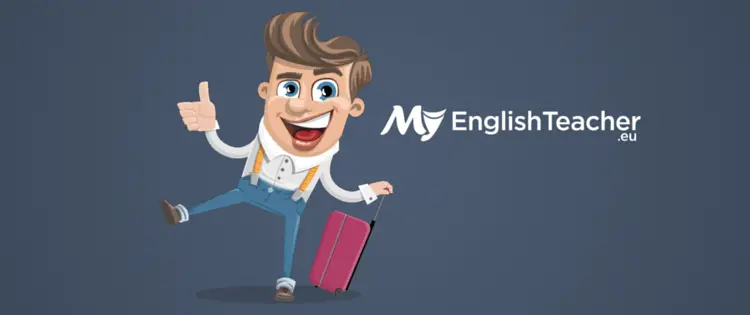
Landing: an instance of coming or bringing something to land, either from the air or from water.
Customs: the place at a seaport, airport or frontier where officials check incoming goods, travellers or luggage.
Baggage Collection Point, Baggage Reclaim, Baggage Claim Area: an area where arriving passengers claim checked-in baggage after disembarking from an airline flight.
Nothing to Declare: exiting the airport at a gate where you state that you do not have any goods where duty is payable or that need checking whether entry into the country is permitted.
Credit Card: a small plastic card provided by a bank or company which gives you access to money that you will need to pay back within an agreed time limit.
Debit Card: a small plastic card provided by your bank which gives you access to money that you already have in your bank account.
Porter: a member of staff in a hotel who assists guests with carrying their luggage.
Alarm: something to help you wake up at an appropriate time, this could be a sound notification on your smartphone or a telephone call from staff if you are staying in a hotel.
Room Service: requesting food, drinks or other services to be delivered to your hotel room.
Sample Conversation about Checking-in at the Hotel: Hotel Receptionist = HR, Guest = G, Porter = P
P: Good morning Sir, welcome to The Royal Pavilion Hotel. May I take your bags please? G: Oh, that’s very kind of you! Thank you. I am quite tired after that journey.
P: Please follow me this way to the check-in desk. HR: Good morning Sir, do you have a reservation ?
G: Yes, I booked online. HR: Which name was it booked in?
G: Mr. Graham Watts HR: Yes, I have it here. Could I see the credit card you paid with please?
G: Yes, here you go. HR: Thank you. Would you like an alarm call to wake you up?
G: Yes please. If you could call me around 11am, that’d be great. I would like to rest for a few hours before my meeting. HR: No problem. The complimentary breakfast is served until 11:30 and you can call for room service at anytime.
G: I will most probably do that! Thanks. HR: Your room is number 237 on the third floor and here’s the key. Our porter will help you with your bags and show you to your room.
G: That’s wonderful, thank you. Is there a Wi-Fi connection available in my room? HR: Yes, you’ll find the password in you room beside the TV. We hope you enjoy your stay with us. P: Okay Mr. Watts, if you please come this way, I’ll show you to your room…
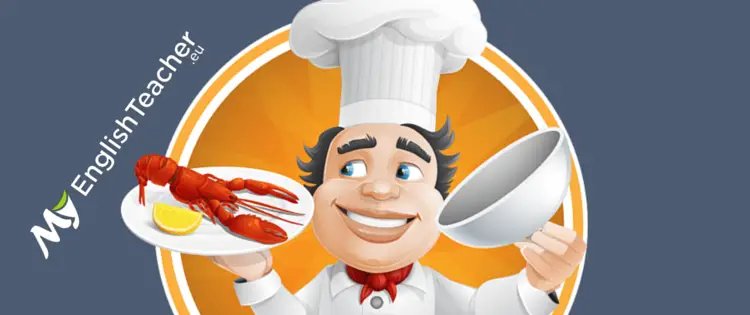
- Kitesurfing
- Rock Climbing
- Windsurfing
- Wakeboarding
- Paddleboarding
- Sunbathing
- Sightseeing
- Amusement Park
- Art Gallery
- Miniature Golf, Crazy Golf
- Animal Sanctuary
- National Park
- Invigorating
- Enervating
- Fascinating
- Old-Fashioned
- Picturesque
- Over-Priced
- Cosmopolitan
- Metropolitan
- Neopolitan
NEXT: Asking for help
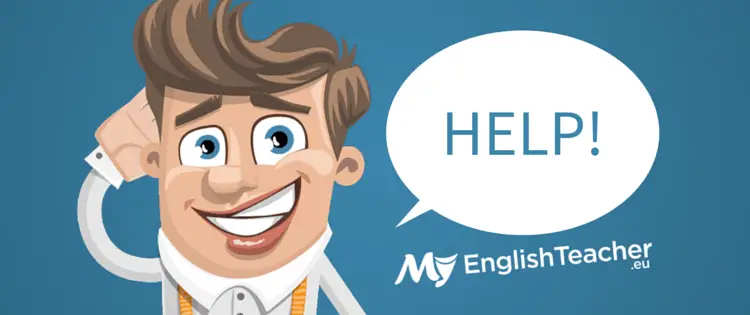
Catching someone’s attention:
- Excuse me, could I ask you a quick question please?
- Excuse me, sorry to bother you but could you help me please?
- Hello sir/miss, …
- Sorry sir/miss, …
- Excuse me, do you speak English?
Asking for information:
- You wouldn’t happen to know where … is, would you?
- I’m trying to find the …
- I need to get to the …
- How can I get to the …?
- Do you know where the … is?
- Where is the nearest …?
- I’m a little lost, where is the …?
If you miss a flight, bus, transfer, train:
- It seems I have missed my … could you please book me onto the next available one?
- I’ve missed my … is there any way of getting a refund?
- I’ve missed my … could you please give me information about the next one?
- Could you please help me to rearrange my …?
When you’re feeling unwell:
- Excuse me, is there a first aid room here?
- I feel really unwell, is there someone who can help me?
- I’m suffering from … do you have medical staff here?
- Do you have a first aid kit I could use please?
- I’ve injured my … could you please help me?
If there is something wrong with your luggage:
- My suitcase has not arrived yet, where can I get it from?
- My luggage is missing, could you help me please?
- My rucksack has been damaged, what can I do about this?
- I cannot find my suitcase, where can I check please?
Asking someone to translate:
- Could you tell me what it says on that sign please?
- Could you translate this message for me please?
- Could you please ask this person to …?
Prepositions and giving directions:
- (Turn) Right
- (Turn) Left
- Straight On
- Opposite the …
- Next to the …
- The … is on your (right, left)
- Before, After the traffic lights
- Take the first, second, third exit at the roundabout
More for you: Aviation Vocabulary ››› 19 most important words explained Difference between BEFORE and UNTIL Numbers, Years, Length, Dates in English!
RELATED ARTICLES MORE FROM AUTHOR

Understanding the Extroverted Introvert

Your Guide: List of 30 Helpful Synonyms with Explanation and Examples

50 Creative Ways to Say Happy Birthday: My Top Picks

48 Another Word for Impo or Important

Bear Homophones Demystified: Expert Guide
![Names of Generations, Years and their Characteristics [Generations Timeline] Names of Generations and years: The Greatest Gen, Baby Boomers, Gen X, Y, Z](https://www.myenglishteacher.eu/blog/wp-content/uploads/2020/06/Names-of-Generations-218x150.png)
Names of Generations, Years and their Characteristics [Generations Timeline]

I like using standard english

Such a great job to run this awsome site.

that is wonderful!
MOST POPULAR

👉 A BIG List of Prefixes and Suffixes and Their Meanings

200 Phrases for saying THANK YOU in any situation!

Formal and Informal Email Phrases – from Greetings to Closing Phrases!

Linking Words: List of Sentence Connectors in English with Examples!

80 In Conclusion Examples! + Translation

90 Names of Baby Animals and Their Parents

Talk to Strangers / Free Chat Rooms

English Level Test

6 Ways to Immediately Improve Your English Communication Skills

What does TBH mean? (TBH full form) on Facebook, Instagram, Texting

25 Ways to Say “Keep Up The Good Work” 💪 &...
Stay connected, editor picks.

Supposition Meaning

Summary of how Components of Health are related to Wellness

POPULAR POSTS
Popular category.
- Q&A 2439
- English Vocabulary 624
- English Vocabulary Dictionary 363
- English Grammar 200
- Synonyms 147
- Infographics 109
- Collocations 105
- Learn English 81
- English Idioms 69
- Privacy Policy
- Terms & Conditions

Live-English.net
Learn English Online with real teachers
40 Basic Vocabulary Words and Common Phrases for Travel in English
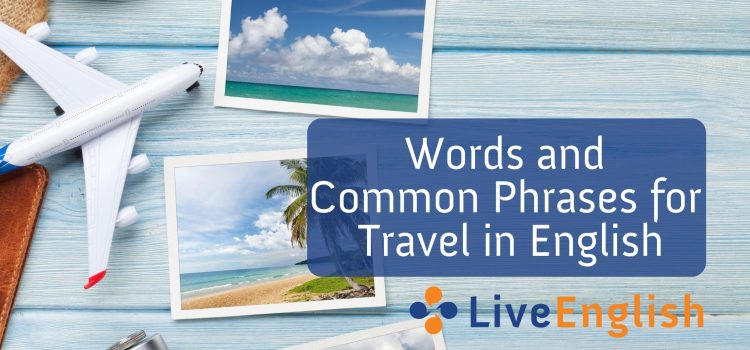
Embarking on a journey to a foreign country can be both exciting and a bit daunting, especially when language barriers come into play. But fear not, we’ve got you covered! This page is dedicated to all the globetrotters out there who are keen on enhancing their English language skills specifically for travel.
We’ve curated a list of 40 essential English words and phrases that will prove to be your best companions on your travels.
Whether you’re a seasoned traveler or planning your first overseas trip, mastering these words and phrases will not only boost your confidence but also enrich your travel experiences. So, let’s dive in and start preparing for your next adventure with our comprehensive travel vocabulary guide. Happy learning and safe travels!
40 essential English words and phrases for travel
- Passport – “Don’t forget to bring your passport to the airport.”
- Luggage – “Please make sure your luggage is not left unattended.”
- Reservation – “I have a reservation under the name Smith.”
- Itinerary – “Our itinerary includes stops in Rome, Paris, and London.”
- Destination – “Our final destination is Sydney.”
- Accommodation – “I’ve booked accommodation for three nights in the city center.”
- Sightseeing – “We’re going sightseeing in the old town tomorrow.”
- Currency – “What’s the local currency in Japan?”
- Boarding Pass – “Please have your boarding pass and identification ready.”
- Departure – “Our departure time is 6:00 PM.”
- Arrival – “Our estimated arrival time is 8:00 PM.”
- Customs – “You’ll need to declare any items at customs.”
- Visa – “Do I need a visa to travel to the United States?”
- Tourist – “As a tourist, I love exploring new places.”
- Landmark – “The Eiffel Tower is a famous landmark in Paris.”
- Guidebook – “I bought a guidebook to learn more about the city’s history.”
- Souvenir – “I bought a souvenir from each city we visited.”
- Jet Lag – “I’m feeling a bit of jet lag after the long flight.”
- Travel Agency – “The travel agency arranged all of our accommodations.”
- Backpack – “I prefer to travel with a backpack instead of a suitcase.”
- Could you help me, please? – When you need assistance.
- How much does this cost? – When you want to know the price of something.
- Where is the nearest…? – When you’re looking for something specific, like a bathroom or a subway station.
- I would like to book… – When you want to make a reservation.
- Do you speak English? – When you need to find someone who speaks English.
- I’m lost. Can you help me? – When you need directions.
- Can I have the menu, please? – When you’re at a restaurant and want to see the menu.
- I’m allergic to… – When you need to inform someone of your allergies.
- Can I have the bill, please? – When you’re ready to pay at a restaurant.
- What time does it open/close? – When you want to know the operating hours of a place.
- Can I have a ticket to…, please? – When you’re buying a ticket.
- Where can I catch the bus/train? – When you need to find the bus or train station.
- Is it far from here? – When you want to know the distance to a place.
- Can you recommend a good…? – When you’re looking for recommendations.
- Do you accept credit cards? – When you want to know if you can pay with a credit card.
- What’s the Wi-Fi password? – When you need to connect to the internet.
- I’d like to go to… – When you’re telling a taxi driver your destination.
- Is there a pharmacy nearby? – When you need to find a pharmacy.
- Can I try this on? – When you’re shopping for clothes and want to try something on.
- Could you take a picture of us, please? – When you want someone to take a photo of you and your group.
Wrapping Up Our English Travel Vocabulary Journey
And there you have it! We’ve journeyed through 40 essential English words and phrases that will help make your travels smoother and more enjoyable. Remember, language is a powerful tool that can open doors to understanding new cultures, making new friends, and creating unforgettable experiences.
Don’t worry if you can’t memorize all the words and phrases at once. The beauty of language learning is that it’s a continuous process. Keep practicing, and soon these words will become second nature to you.
But why stop at 40? If you’re eager to expand your travel vocabulary even further, we have an exciting offer for you. Follow us on Instagram and send us a direct message to get your hands on our comprehensive eBook (write “Travel eBook”), which features 200 essential English words and phrases for travel, plus 2 special bonuses!
We hope this guide will be a valuable resource for your travel adventures. Whether you’re exploring bustling cities, tranquil countryside, or exotic beaches, these phrases will help you navigate your way with confidence.
Thank you for joining us on this linguistic journey. We wish you all the best in your English learning and your future travels. Remember, every journey begins with a single step, or in this case, a single word. Happy travels and happy learning!
>> Learn more English vocabulary
Privacy Overview
My English Language
English language resources for efl students and teachers.

Travel and Transport
Travel vocabulary: using english for travel.
Travel vocabulary is one of the most useful areas of language learning today, as more people than ever are travelling far and wide for business and pleasure. There are many useful words and phrases we use when travelling and dealing with transport.
Although our travel plans have been put on hold for a while due to the Coronavirus pandemic , the world is slowly starting to open up again. This means we need to be ready with our travel language and vocabulary for when we can get a flight, a bus or a train!
For non-native speakers , travel vocabulary is a particularly useful topic of study and always a popular subject, allowing you to enjoy organising your travels without worrying about language issues.
Explore travel vocabulary here and learn useful vocabulary related to travelling and using public transport. We have included useful words related to using trains, buses, cars, taxis, planes and boats, so you can have your travel phrases covered, whatever your mode of transport.
General English Travel Vocabulary:
to arrive , to depart, to leave, to stay,
to cancel, cancellation, cancelled, delay, delayed
to book, to reserve, reservation, to cancel a reservation
holiday, business trip
suitcase, bag, luggage
trip, journey, to travel, map
travel agent, brochure
ticket office, fare, price, single/return ticket
by foot, on foot
travelling by plane, by train, by taxi, by car, by boat
roundabout, road, traffic lights, speed limit, junction, cross roads, road signs
Image source
Transport Vocabulary and Useful Phrases:
Wheels, steering wheel, dash board, indicators, headlights, roof, bonnet, boot, engine, battery, windscreen wipers, garage, car mechanic, petrol station, service (a ‘check up’ for a car)
Double decker, single decker, passengers, bus driver, bus stop, bus station, bus conductor, coach, luggage hold, bus lane
Bus travelling phrases:
the next stop, the last stop, to get on/off the bus, to buy a ticket
Train station, platform, track, level crossing, locomotive, underground, cross-country, local, return, single, ticket, carriage, first/second class, train driver, ticket inspector, waiting room, seat, timetable, guard, season ticket, fare, travel card, buffet car
Train travel phrases:
to catch a train, to check the timetable, on the platform, to travel cross-country
to get on the train, to embark, to set off (on a journey)
to get off the train, to disembark, to alight
ticket machine – a machine where you can buy your train tickets
ticket gate – a mechanical gate blocking access, where you need to insert your ticket to pass through
the buffet car – a carriage on a train where you can buy drinks and snacks
Grand Central Station , New York City – image source
Cab, black cab (official English taxi), fare, taxi rank, taxi driver, tip ( noun and verb )
Taxi travel phrases:
to hail a taxi / to flag down a taxi (when you raise your arm to get a taxi driver’s attention to encourage it to stop in the street)
to pay the fare (the fare is the fee for the journey)
to tip the driver (verb) / to give the driver a tip (noun)
Aeroplane, airport, airline, wing, runway, pilot, gate, passport, excess baggage charge, cabin crew, flight attendant, air steward/stewardess, security, turbulence, seatbelt
take off, landing
turbulence (uncomfortable, sudden movements of a plane due to air pressure/temperature changes)
hand luggage (luggage you take into the cabin with you)
hold luggage/checked luggage (luggage you check in for stowage under the aircraft)
over-head locker (where you can put your hand luggage)
boarding card, customs, departures, arrivals, lounge, aisle seat, window seat, check-in, in-flight movie, in-flight entertainment
terminal 1, terminal 2 / T1, T2 (a terminal is where passengers go to buy tickets, check in luggage, go to their boarding gate etc.)
boarding gate – where passenger go to board the plane (i.e. to get on the plane), located inside the terminal building
A plane takes off – image source
Plane travel phrases:
to put luggage/bags in the hold
to board the plane
prepare for take off, the plane will be taking off in 30 minutes
prepare for landing, the plane will be landing in 20 minutes
to fasten your seatbelt, to buckle up (‘buckle up’ is slang for ‘fasten your seatbelt’)
the flight was quite turbulent, to experience some turbulence, there was some light/heavy turbulence
“How was your flight?”
“It was good, thanks, except there was some turbulence during the descent that made me spill my drink!”
“Great – it was a smooth flight and I slept most of the time.”
Ferry, cruise ship, harbour, deck, port, sea, ocean, cabin, captain, sail, sea sickness , crossing, on board, life belt/jacket, foot passenger, buffet, port side, starboard
- The difference between a boat and a ship: boats are small to mid-sized vessels, often used for pleasure trips. Boat is also a generic term for water vessels. Ships are normally larger and are used to carry cargo, passengers or smaller boats.
Boat travelling phrases:
to embark (to get on the boat) / to disembark (to get off the boat)
‘choppy’ seas / rough seas / strong waves
Calm waters will provide a peaceful cruise for this ship – image source
calm waters / still waters
to sail, to have a good crossing (a ‘crossing’ is when you go from one place to another on a boat/ship) – e.g. “Did you have a good crossing?”
to go out on deck (to go outside on the ship)
welcome aboard/on board (you might hear this when you embark for the first time)
the captain’s table (where the captain sits at dinner – sometimes passengers might get an invitation to site at the captain’s table at some point during their cruise)
- ‘Plain sailing’ is an idiom that means an event that goes smoothly: ‘It’s all plain sailing from here’
It’s a great day to be ‘out on deck’ – image source
English at the Train Station
Useful travelling vocabulary for using the train, including phrases you may want to say, phrases you may hear and comments you might want to make about travelling by train:
- Train times on timetables are always given in the twenty-four hour clock format. So, 5.15 pm would be 17.15 and 9.05 am would be 09.05.
A busy airport – image source
“How was the journey?”
“It was fine, the train arrived on time and I managed to buy a coffee from the buffet car.”
“Terrible, the first two trains were cancelled and then I had to stand up for the entire journey.”
“My train was delayed, so I passed the time by browsing in the station bookshop”
English vocabulary at the airport
Travelling vocabulary for using planes and visiting the airport, including phrases you might hear at the airport and sentences you might need to say when travelling by plane:
Click here to explore more essential English vocabulary and phrases for everyday situations.
When travelling and using transport, you might also need to ask for directions. Check out how to ask for directions in English when travelling around a city with our directions page. Our article includes possible questions you might want to ask and answers you could receive when navigating your way around a new town.
Let us know your thoughts on travel vocabulary
What do you find most difficult about using English when travelling?
Do you find any of these phrases related to travel and transport confusing?
Can you think of other useful English travel vocabulary for using different modes of transport?
TEFL teachers, how do you incorporate travelling vocabulary into your English lessons?
2 thoughts on “ Travel and Transport ”
Thank you for the provided phrases and words. I would also like to see a short dialogue or common phrases when someone got lost in a city or trying to get somewhere, so that there should be various options for speaking about traveling ina city
Hi Tatyana, thanks for your comment. A dialogue like this is a great suggestion. We will looks to add something like this to the travel and transport page soon. In the meantime, you might find our directions page useful, as this contains phrases for asking for directions when travelling in a city.
Leave a Reply
Your email address will not be published. Required fields are marked *
You are using an outdated browser. Please upgrade your browser or activate Google Chrome Frame to improve your experience.
Travel English Phrases You’ll Need for Your Next Trip
English is essential for communication in most countries.
Wherever you are going, you need to have a good grasp of the basics of the language to get around and communicate at the airport, hotel and everywhere in between.
This post has dozens of travel English phrases to help you navigate any foreign country. Learn what they mean and how you can use them!
At the Airport
On the airplane, arriving at your destination, riding public transportation, at the hotel, at a restaurant, sightseeing, emergencies, and one more thing....
Download: This blog post is available as a convenient and portable PDF that you can take anywhere. Click here to get a copy. (Download)
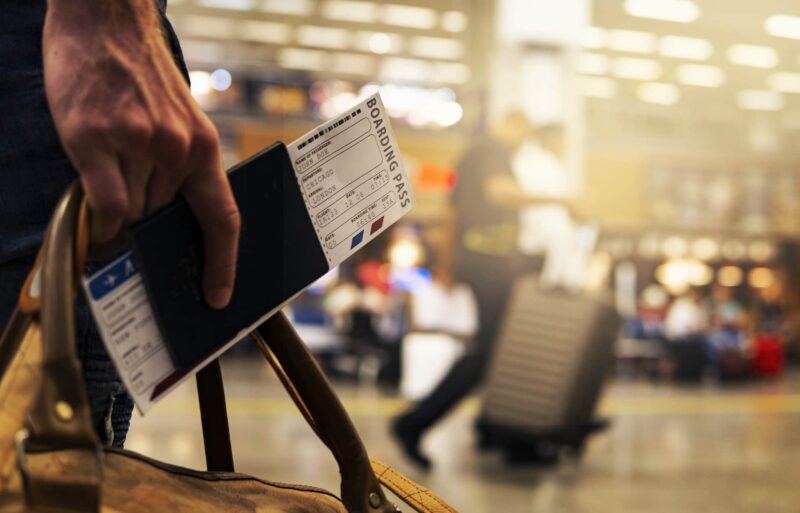
Excuse me, how do I… ?
If you are flying for the first time, you will need information on how to:
- Check in. When you check in , you are letting the airline know you have arrived. If the person you are talking to tells you to go to the check-in counter, you can follow up this question with “how do I get to the check-in counter?” to get directions. At the check-in counter, you present your ticket , a document that allows you to get your boarding pass. The boarding pass, in turn, will allow you to board (ride) your airplane.
- Board the airplane. If you are not sure about what you should do before you get on a plane and during your flight, you can ask the airline staff about this.
Where is the… ?
You will likely ask for general directions to one or more of the following:
- Information desk. As you can guess from the name, the information desk is where you can learn everything you need to know about getting around the airport. You can even ask for a map (a picture guide of the area) from them.
- Gate. A gate is where you will enter to get to the airplane. It is also the place where you wait before boarding your flight. The gate is usually written on your boarding pass.
- Restroom. A restroom is a place where you take care of personal business like combing your hair, washing your face or using the toilet. Depending on the country you are visiting, this room may also be called a bathroom , washroom, comfort room, loo or toilet .
- Charging station. If your phone has low or no battery, these places can get your device’s battery up to 100 percent again.
- Restaurant. If you feel hungry while waiting for your flight, you can visit a restaurant where you can eat in the meantime.
How do I get to… ?
Although they both seem to ask for directions, there is a slight difference between “where is the… ?” and “how do I get to… ?”
“Where is the… ?” will get you a general answer like “(The place you want to go to) is at Building A.”
Meanwhile, “how do I get to… ?” asks for specific directions, so the person you are talking to will reply with “From here, you turn left, and when you see this sign, turn right…” and so on.
What time is my flight?
Often, it may not be clear what time your specific flight is—in which case, this question will be useful.
What items am I allowed to bring on board?
Airlines usually have rules on what you can and cannot take into the airplane.
How much luggage am I allowed to carry on?
Your luggage includes all the bags you are bringing with you for the flight. Airlines often have limits on how much and how heavy your luggage should be.
Are meals included?
A meal is a collection of food served at one time. Not all airlines provide meals, so it may be good to ask if you will get these before you board.
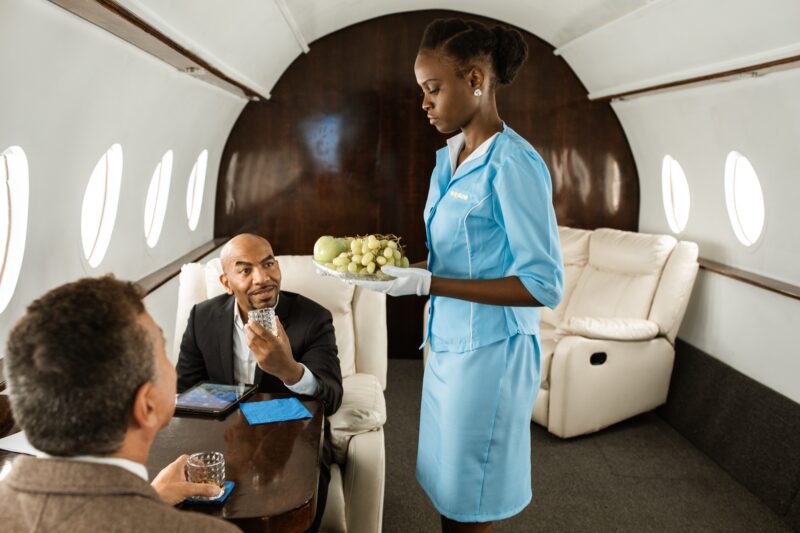
Excuse me, can you please help me put my luggage away?
Airplanes have baggage compartments or closed spaces above each of the seats. You can ask the flight attendant, an airplane employee in uniform who is usually female, to help you put your luggage in its compartment.
Can I please change my seat?
Once you get on the plane, you may want to change your seat because other seats are more comfortable, have a better view, etc.
How much does… cost?
You can ask about the cost of anything you want to buy like the following:
- water bottle
- snack (a small meal)
I would like… , please.
This phrase is the standard and polite way to ask for something that is usually free or something you do not have to pay for. For example, if you are thirsty, you might say “I would like a glass of water, please.”
Does my seat have… ?
For example, if you want a device to return your phone’s battery charge at or above acceptable levels, you can say “does my seat have a charging port ?” And if you want to move the seat back so you can lie down, say “does my seat have a recline button ?”
Excuse me, I need to…
There are a few things you can ask permission for on a plane. You can say “Excuse me, I need to…”
- Get out of my seat
- Use the restroom
- Move my luggage
What time is it?
This is a standard question for figuring out what time of the day it is. It is useful when you are flying over different time zones and when the plane finally lands.
For more vocabulary and phrases related to air travel, take a look at this post—it’s aimed at flight attendants, but you’ll learn a thing or two as well!
Knowing English for flight attendants is essential in today’s interconnected world. These 60+ English words and phrases will prepare you for the job before, during and…
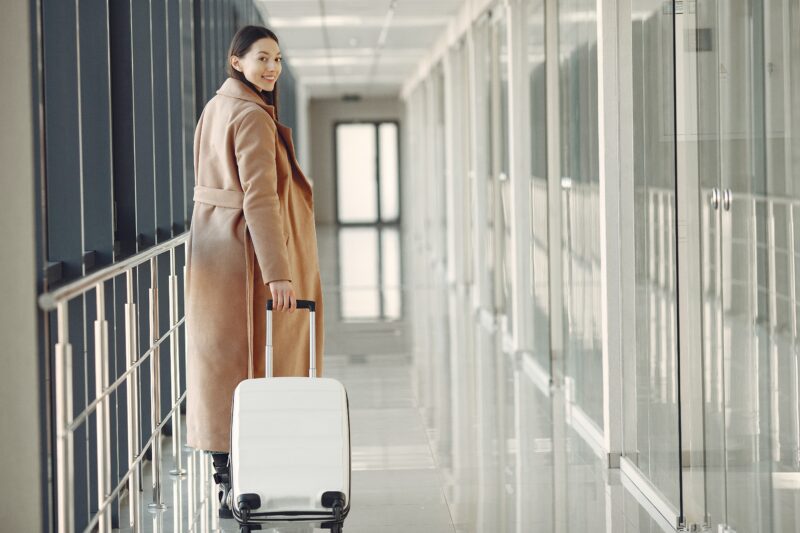
Once you are at your destination (the place you are visiting), some of the useful phrases you can use are the following.
Just like at the airport when you first arrived, “Where is the… ?” and “How do I get to… ?” are useful phrases when you are at your destination.
Some of the places where you might need directions are:
- Baggage claim area. Remember when you checked in your luggage? This is the place where you claim or get it.
- Currency exchange. A currency exchange is a place where you take the money you use in your own country and get it changed to the money used at your destination.
- Bus stop. Finding a bus stop will be especially helpful if you want to find a cheap way to get around. Asking “where is this bus going?” can also help you know if you are riding the right bus.
- Taxi / Taxi stand. No bus? Take a taxi instead, which is also called a cab in some places. You can usually find a group of taxis at taxi stands.
- Hotel. Of course, you should provide the name of your specific hotel.
- Immigration or customs. Immigration or customs is the place where you have to explain why you came to a country and tell officers what your intentions are.
Sorry, I do not understand what you are saying.
This phrase will help native English speakers know English is not your first language. You can also say “I do not speak English very well” and ask them to “please speak slowly” if you are still having trouble.
I recommend that you prep before you go by studying authentic English media like movies and TV shows. These can help you prepare for real interactions in English.
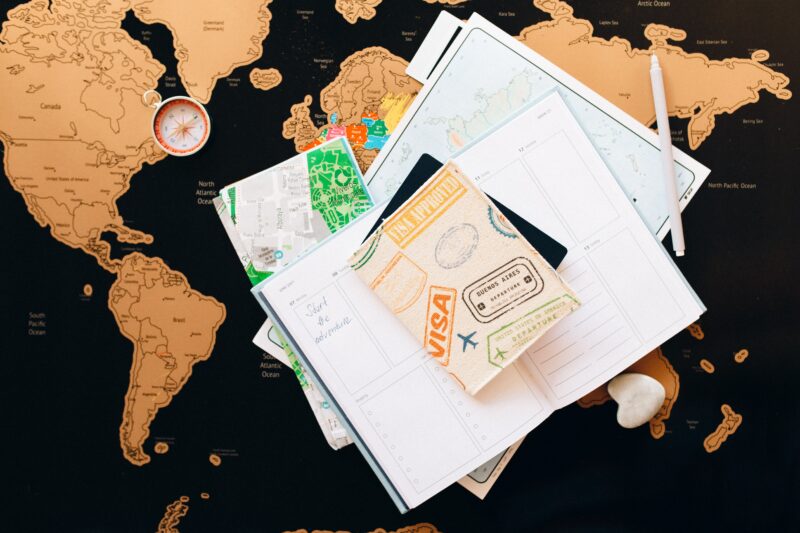
I have items to declare.
Aside from explaining why you are in a certain country, you also have to declare (make a formal or official statement on) the items that you may need to pay duties (taxes on items from another country) for.
If you do not have such items, you can simply say “I have nothing to declare.”
I have a connecting flight.
This is how you say you will board another plane to go somewhere else.
I am traveling for…
Depending on why you came to the country, you can say you are traveling for:
- Leisure. Say this if you are traveling because you are on vacation.
- Work. Say this if you are traveling because your company asked you to .
- Family. If you are traveling because you are visiting relatives, let the customs officer know.
I will be here for… days.
You will need to provide the number of days you will be staying in the country, like “I will be here for 90 days.”
If you have it, you can also show your visa , a document that proves you are allowed to enter the country for a certain purpose within a certain period.
I am staying at…
The customs officer may ask you where you will be sleeping. You can say “I am staying at (the name of your hotel)” or “I am staying at (the address of your family or friend in the country).”
Check out more airport vocabulary here .
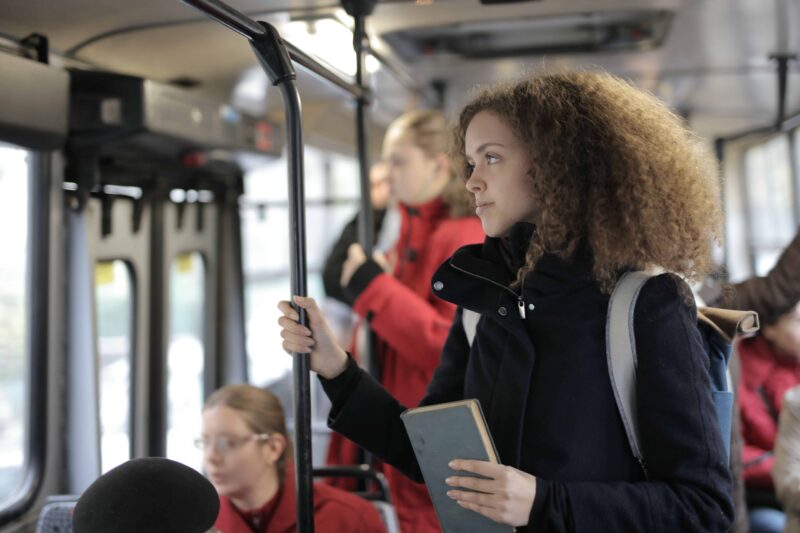
Now that you have arrived, you need to know how to get around. Here are some useful phrases you can use whether you are riding a bus, train or any other form of public transportation.
Does this go to… ?
Before you get on a bus or train, ask whether it is going to the place you want to go. If the driver says no, you can ask “how do I get to… ?” and take note of the directions they give you.
How long does it take to get to… ?
Here, you are asking how many minutes, hours, etc. it will take for the vehicle to get to your destination.
How much is the fare?
The fare is the price of riding your public transport.
“Do you accept… ?”
End this question with a mode of payment , which includes cash and cards .
Excuse me, is this seat taken?
This phrase is useful if you see someone with an empty seat beside or near them, but you want to be 100% sure they do not have a companion.
I missed my stop. Can you please let me know when we are at the next one?
In an ideal world, traveling would go smoothly. But sometimes, things like not being able to get off at your stop happen! Luckily, you can use this phrase to get you out of a pickle (get you out of trouble).
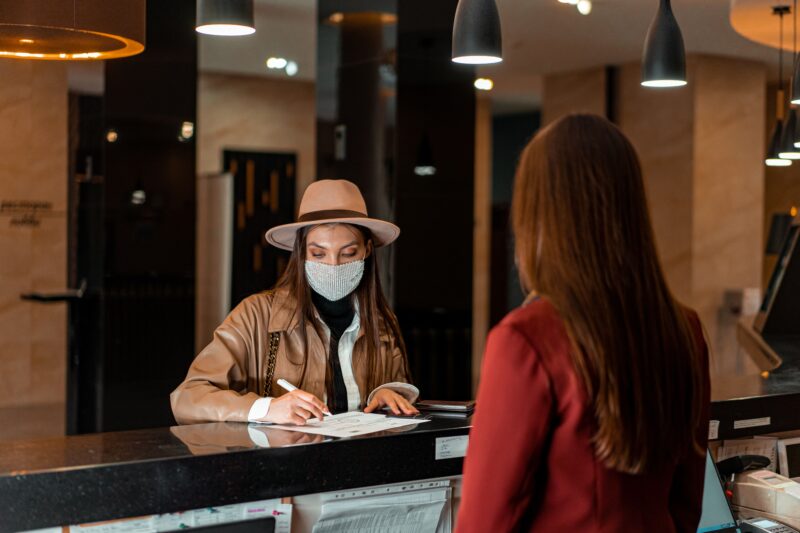
Of course, if you are staying with friends and family, you can skip this section. But if you will stay at a hotel, keep the following phrases in mind.
Greetings! I have a reservation under the name of…
End the phrase with your full name or the name you used to make your reservation.
When you get to your hotel, go to the front desk. It is easy to find because that is usually where you will first meet the hotel’s employees. Also, that is where the other guests will probably be!
You want to confirm that you have a reservation first—that is, proof that you have a room at the hotel where you are staying. Otherwise, you have to look for somewhere else to stay.
What is included in my reservation?
This question asks what services you have already paid for. Of course, there is your room, but you may also want to check for other things like breakfast, pool, spa, etc.
What time is check-in / check-out?
Since you will not be staying at the hotel all the time, you will want to know what time you can check in and check out.
Check in means the time you will be allowed to enter your room, while check out means the time you should leave your room.
Does the room have a… ?
You may also want to know about your room’s amenities (things to help make your stay more convenient and comfortable). For example:
- Bathroom / restroom. Again, the correct term for this place depends on where you are.
- Refrigerator / fridge. A refrigerator or “fridge” is a place to keep your food and drinks cold. Keep in mind that you may have to pay extra for any food or drinks you take out of hotel refrigerators.
- Wi-Fi. Wi-Fi is simply a wireless internet connection. You should probably also ask for the Wi-Fi password. ( “What is the Wi-Fi password?” )
- Air conditioner. An air conditioner is a piece of equipment that cools a room.
How many beds are in the room?
This question will help you know if there is enough space to sleep for the number of people in your hotel room.
What floor am I on?
A floor in this situation refers to the level of the hotel.
If you are on a high floor (like the 30th, for example), you may want to use the elevator , the device that lifts and lowers you between floors of the hotel, to help you get to your room.
My room needs…
Most of the time, housekeeping (the people who clean the room) will make sure you have everything you need. Should they forget, you can say “My room needs…” and finish with:
- Towels. Towels are soft, thick materials you use to dry yourself after taking a bath.
- Toilet paper. Toilet paper are thin white sheets rolled up on tubes. They help you wipe yourself in the bathroom.
- Bedsheets. “Bedsheets” is a term that includes pillowcases, blankets and all the other pieces of cloth that cover your bed.
Could I please have room service ?
As a guest, you can request services by saying “Could I please have… ?” For example, you can request room service , where someone will come up to your room to deliver food, drinks and other things you may need.
Where is the best… around here and how do I get there?
Since the hotel employees are locals, they will probably know the area more than you do.
Before you check out of your hotel, you can use this phrase and replace “…” with:
- Grocery store. Grocery stores are places where you can buy most types of items.
- Hospital. If you or someone you are traveling with gets sick or injured, you need to know where to go.
- Bank. If you run out of money, you may need to go by a bank to get more.
- Restaurant. Make sure you ask for a restaurant that offers local cuisine or food.
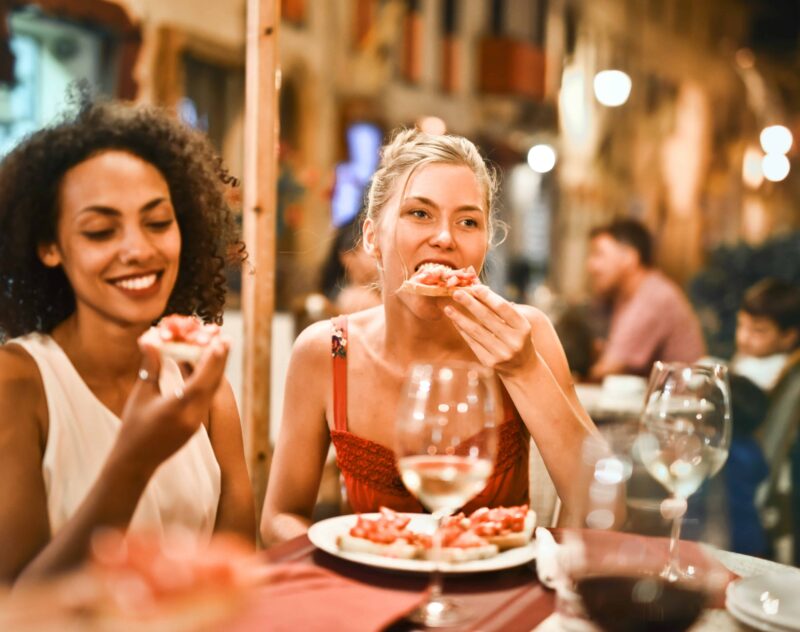
A table for two, please.
The number indicates how many people will be eating with you at the restaurant. It does not have to be just two: it can be any number of people with and including you.
I would like to drink…
Finish this phrase with the name of the drink you want. Popular drinks are:
- soda pop (carbonated sweet drinks)
May I see a menu?
A menu will help you decide what you want to eat.
I would like to order, please.
Once you have decided what to eat and drink, raise your hand and wait for a waiter to come to your table. Then, say this phrase to indicate that you are ready to order or ask questions about the food.
Could you recommend any popular dishes?
This is a good question to ask if you are not sure what to order.
May I ask if you have dishes that are… ?
You may prefer certain foods to others for personal reasons. For example, you can finish the question with any of the following:
- Vegetarian / Vegan When you say that dishes are vegetarian , that means they are mostly made of plant-based ingredients. When you say they are vegan , it means they do not have any animal ingredients (even eggs or milk!) at all.
- Halal. If you are a Muslim, you want to make sure that what you eat does not go against the laws of your religion. You may need to explain what ingredients make a food halal or haram , though.
Can you tell me about any potential allergens in this dish?
Allergens are ingredients in your food that can cause you to have a negative reaction. It may be a good idea to ask about these before you order a dish. The last thing you want is to not enjoy your meal because you got sick!
Can I please have… ?
Fill in the blank with an item off of the menu or one of these items:
- Appetizer. An appetizer is a small dish you eat before the main course (meal).
- Soup. Soup is a common way to start meals.
- Salad. If it is too warm for soup, try a salad!
- Dessert. A dessert is a sweet dish you eat after the main course.
- A glass of water. If you are not interested in any particular drinks, a glass of water is always a good option.
- Extra sauce / salt / spice. If you think your dish could use a little more sauce, salt or spice, you can ask if you can have more.
Can I ask for a refill?
The word refill comes from the prefix re- (which usually means “to repeat”) and fill . If your glass of water is empty and you want more, you can ask for a refill so your empty glass will have water again.
May I have the bill?
The bill indicates how much you have to pay after you eat the meal. Make sure to ask for this. In some restaurants, the waiters will not bring it to your table unless you ask.
If you want more useful English phrases to use in restaurants, check out this post on ordering food in English .

Of course, your trip would not be complete without souvenirs or items you buy to remember the place you visited! To make the most of your visits to shops, here are a few phrases to keep on hand.
Excuse me, where can I find… ?
Finish the question with what you are looking for.
Excuse me, how much is this?
This is a standard phrase for asking the price or cost of items.
Do you offer discounts?
When you ask for discounts , you are asking if the item comes at a lower price. Usually, the discount is shown in percentages (%). For example, if an item is $10 and there is a 50% discount on it, the final price would be $5.
Do you have a sale?
Another way to save money is to watch out for sales or events when you can buy items for much lower than their original cost.
Does this come in a bigger / smaller size?
If you are buying clothes, you may not be able to find something that fits you. In that case, use this phrase to check if they have your size. You can also ask “can I try this on?” to make sure the piece of clothing really fits!
What is your return and exchange policy?
Sometimes, you end up buying an item that you do not like or has defects (something wrong with it). A return and exchange policy allows you to either return (give back) the item to the store or exchange (switch or change) it with a similar one.
What forms of payment do you accept?
Here, you are asking if they accept cash, cards or any other form of payment you have on hand.
Can you recommend something similar to this?
If you find something you like but not quite or you want more varieties (colors, sizes, etc.) of the same item, this is a good question to ask.
For more shopping vocabulary you should know, go here .

Aside from the stores, you also want to check the sights and sounds of your destination! For those, here are the phrases you can use.
Where is the visitor information center?
The visitor information center is where you can get everything you need to know about an area—maps, landmarks, restaurants, shops, etc.
Excuse me, can you tell me what attractions I should check out around here?
There may be so many attractions in the area, you will not know where to start. This question can help you make your itinerary or travel plans for the day.
Are there any guided tours for this area?
Then again, you may not need to explore the area on your own. With a tour guide , you can plan where you want to go, get information on each attraction and even some interesting tidbits (facts) about them!
Are there any rules and restrictions I should know?
As a visitor, the last thing you want is to get into trouble. You want to know what you should do (the rules) and what you should not do (the restrictions).
Can you take a photo of me in front of… ?
A trip is not complete without pictures you can post on social media! There are times when you may want to take pictures of yourself in front of a site and that is where this phrase comes in.
Are there any events or festivals around here?
If you want to enjoy the place the way the locals do, this is a question you should ask.
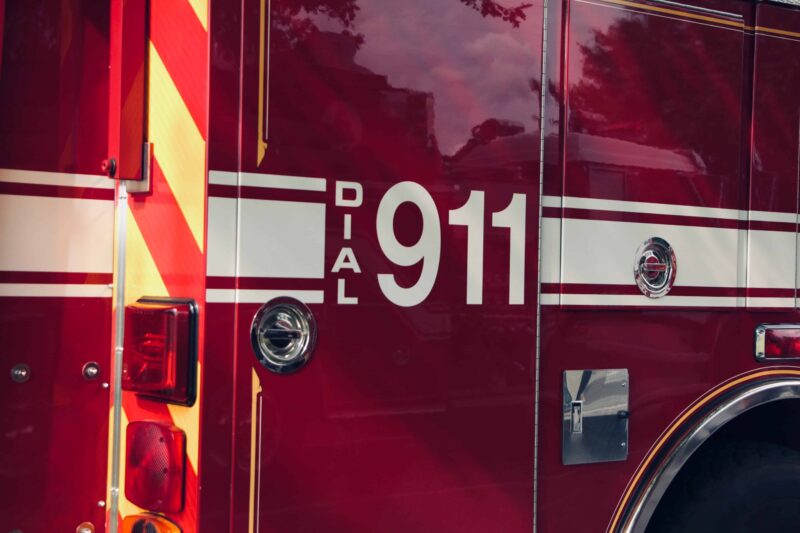
Even with careful planning, you may encounter some problems with your travels. Here are some phrases to help you out if something bad happens.
I have lost my…
End this phrase with any valuables (important items) you lose, such as:
- Passport. If you lost your passport, you need to find an embassy or state organization that represents your home country in the place you are visiting. To ask for directions to the embassy, say “where is the embassy for… ?” and end the question with your country’s name in English.
- Wallet. If someone stole your wallet or something else from you, you need to contact the local police , the organization responsible for dealing with crimes. In the United States, for example, you can call 911 on a phone.
- Way. When you say you have lost your way , you mean you are not sure where you are and where you should go. If you have a destination in mind, you can say “how do I get to… ?” and end the question with where you want to go.
If something bad is happening to you, calling out this word will get people’s attention and—hopefully—get you the help you need.
I feel…
Sometimes, the people who come to help you may need more information about what you need help with. For example, you could say “I feel…”
- Dizzy / Faint. Dizzy or faint means your head feels light, as though it is being turned around and around.
- Sick. If you do not feel well in any way, you should say “I feel sick.”
If your body hurts, you can also say “I am in pain.”
With these travel English phrases, you should be able to get around most countries without much trouble.
Enjoy your trip!
If you like learning English through movies and online media, you should also check out FluentU. FluentU lets you learn English from popular talk shows, catchy music videos and funny commercials , as you can see here:

If you want to watch it, the FluentU app has probably got it.
The FluentU app and website makes it really easy to watch English videos. There are captions that are interactive. That means you can tap on any word to see an image, definition, and useful examples.

FluentU lets you learn engaging content with world famous celebrities.
For example, when you tap on the word "searching," you see this:

FluentU lets you tap to look up any word.
Learn all the vocabulary in any video with quizzes. Swipe left or right to see more examples for the word you’re learning.

FluentU helps you learn fast with useful questions and multiple examples. Learn more.
The best part? FluentU remembers the vocabulary that you’re learning. It gives you extra practice with difficult words—and reminds you when it’s time to review what you’ve learned. You have a truly personalized experience.
Start using the FluentU website on your computer or tablet or, better yet, download the FluentU app from the iTunes or Google Play store. Click here to take advantage of our current sale! (Expires at the end of this month.)
Enter your e-mail address to get your free PDF!
We hate SPAM and promise to keep your email address safe


- All Lessons
- business english
- comprehension
- culture & tips
- expressions
- pronunciation
English Travel Vocabulary: Planning a trip
about engVid
Learn English for free with 2046 video lessons by experienced teachers. Classes cover English grammar, vocabulary, pronunciation, IELTS, TOEFL, and more. Join millions of English learners worldwide who are improving every day with engVid.
- 2-Intermediate
- Privacy Policy
© 2024 LearnVid Inc.

Making Travel Plans
Travel English
In this lesson, Ellen and Martin Baxter make travel plans. Students listen to the couple’s conversation and practice it. The lesson includes a vocabulary and comprehension check.
- Facebook Profile
Learning English with Oxford
The latest language learning tips, resources, and content from oxford university press., essential english travel vocabulary | part 2.
- by Oxford University Press ELT
- Posted on August 23, 2023 August 29, 2023

In Part 1 of our Essential English travel vocabulary blog, we talked about the exciting phase of planning your trip and the different activities you might want to do while on your holidays. We looked at lots of traveling vocabulary in English.
Now, we will look at travel and tourism vocabulary that will help you talk about your preferences and feelings about the activities and things you’ve been doing. These phrases will allow you to share what you love (and don’t love) about your experiences on holiday.
Ways to describe activities you enjoy
There have likely been many things you’ve done during the holidays that you’ve enjoyed and want to share with your friends and classmates when you return to school.
- You might want to say that you dug deep into your own town where you live, and visited some parts of it that you’d never been to before. Maybe you were a tourist in your own town. You might have visited galleries, parks, museums or even streets you’ve never walked down before.
I dived deep into my own city and went for a walk in an area I’d never visited before. I was a tourist in my own town!
- Maybe you’ve had a chance to relax and clear your mind . You may even have taken time to disconnect and stay off your phone or social media.
I felt it was time to disconnect and take some time for myself to clear my mind.
- Did you spend a lot of time outdoors, connecting with nature? Perhaps you went for a long walk in the forest, hiked a mountain, or even took a slow walk through a beautiful park.
I like to connect with nature by going on long walks in the countryside.
- You might have traveled abroad and taken an all-inclusive holiday. This means all your food, drinks, and activities are included in the price.
My favourite part of an all-inclusive holiday is having food available whenever you want it!
- You might have gone camping, but taken a lot of things with you so that you could have the comforts of home. This means that things made you feel at home, even though you weren’t there.
Though I love exploring new cities, I always choose accommodations where I can have the comforts of home.
Ways to describe experiences you don’t like or want
Maybe you had some experiences that you didn’t like so much or didn’t want to do. It’s just as important to share the negatives as the positives!
- Maybe you had an experience that tugged at your heartstrings . This means that something made you feel strong emotions, especially sadness.
Seeing the news about that forest fire really tugged on my heartstrings – it was so sad.
- Perhaps you wanted a change of scenery but didn’t have the chance to go anywhere to get away from the hustle and bustle of life.
After months in the hustle and bustle of the city, I felt like I needed a change of scenery.
- Did you visit somewhere that was artificial and touristy ? These are places that don’t seem authentic or real and have lots and lots of visitors.
The capital city felt too artificial and touristy for me.
- When you’re on holiday and you want to take your time doing something, you don’t want to be rushed.
I’d like to take my time looking around the gallery – I don’t want to be rushed.
Now, it’s time to share your experiences with your friends, family, and classmates using all this new English travel vocabulary! Whether you stayed at home, traveled abroad, or went exploring around your own country, it’s important to share your stories and highlights (or not-so-good moments)!
Match the English travel vocabulary to their definitions.
Travel vocabulary
1. don’t want to be rushed 2. all-inclusive holiday 3. tourist in your own town 4. clear your mind 5. connect with nature 6. hustle and bustle 7. touristy 8. artificial
A. When you spend time outdoors B. When a place is very busy and noisy C. When you explore the place where you live D. When you want to take your time doing something E. When a place has many visitors and is designed for those visitors to enjoy F. When something is fake or not real G. When food, drinks, and activities are included in the cost H. When you don’t think about anything, or worry or stress
Billie Jago is an ELT writer and teacher trainer, specialising in digital & assessments. She is the founder of the professional development podcast ELTcpd and co-founder of the digital ELT content agency, otterelt .
Share this:
Author: Oxford University Press ELT
Every year we help millions of people around the world to learn English. As a department of the University of Oxford, we further the University’s objective of excellence in education by publishing proven and tested language learning books, eBooks, learning materials, and educational technologies. View all posts by Oxford University Press ELT
Thank you so much for this excellent help.
Thank you so much for such useful information.
Thank you for this very useful información and Travel Vocabulary for English language learners.
Thanks a whole lot for this helpful lesson.
Leave a Reply Cancel reply
Discover more from learning english with oxford.
Subscribe now to keep reading and get access to the full archive.
Type your email…
Continue reading
ESL Lesson Plan: Travel Plans
Robert Deutschman / Getty Images
- Resources for Teachers
- Pronunciation & Conversation
- Writing Skills
- Reading Comprehension
- Business English
- TESOL Diploma, Trinity College London
- M.A., Music Performance, Cologne University of Music
- B.A., Vocal Performance, Eastman School of Music
This English lesson plan helps reinforce vocabulary related to traveling by asking students to plan trips and excursions based on the profile of different groups of travelers. It is helpful to use local newspapers, especially newspapers that provide local events, to give students ideas of real places to visit. Most large cities have specialty newspapers that focus on local events and attractions available for free throughout the city.
Instructions for Teachers
The lesson begins with students deciding which types of groups are going to take a trip. Based on which group of travelers are going, students then use resources to plan out a short stay in a specific city or area of the country. Of course, you can choose to have students focus on distant locations. If you are teaching English in another country, it's probably best to vary this and focus on traveling abroad to allow the use of English place names.
Lesson Aims: Completing a small group task using the internet and other resources available in English, describing a travel destination and itinerary in detail
Activity: Planning a short trip to a specific location based on different traveler types
Level: Intermediate
Lesson Plan
As a class, discuss what types of locations, travel plans, etc. might be suitable for these different types of travelers:
- A married couple on a honeymoon
- Two friends who are attending college
- Two business people
As a class, discuss which resources students can use to make travel plans. There are many travel websites online that offer all the necessary tools for scheduling a trip. If available, use a projector and walk through the process of finding round trip flight tickets and hotels on a travel site.
Using the worksheet below, break students up into pairs or small groups (maximum of 4) assigning a pair of travelers to each group. Have students come up with detailed plans for each travel group. After each group has finished, have them present their travel plans to the entire class.
Variation: To extend this activity, ask students to create a presentation using PowerPoint or another similar software application. Students should find photos and write up bullet points for each of the activities to include in the presentation .
Plan a Trip to ___________ for the Following Travel Groups:
Honeymooners
Mary and Tim have just married and are in the mood for a great honeymoon to celebrate their eternal love for each other. Make sure to include lots of romantic options and some excellent meals to mark this happy event.
College Friends
Alan and Jeff are attending college together and are looking to have a wild week of fun and adventure. They love going to clubs and partying hard, but they don't have a lot of money to eat at fine restaurants.
Cultured Couples
The Andersons and the Smiths are married couples that have been friends for years. Their children are grown up and have their own families. Now, they enjoy traveling together and place a great deal of emphasis on visiting sights of cultural significance. They also love going to concerts and eating fine food.
Business People
These business people are interested in opening up a new company at your chosen location. They need to find out about the area, meet local business people, and discuss their proposal with local government.
Family with Children
The McCarthur family has three children aged 2, 5, and 10. They love spending time outdoors and have a limited budget for eating out. They aren't interested in entertainment, but the parents like to take the children to important museums to help with their cultural education.
Peter and Dan
Peter and Dan married a few years ago. They love to explore gay hot spots in cities they travel to, as well as do traditional sight-seeing tours. They are also gourmets who spend up to $500 on good meals, so they'd like to go to at least one top rated restaurant.
Travel Planning Sheet
Fill in the information to complete the vacation plans.
Dates / Times: Cost:
How many nights?: Cost:
Rental car yes/no? If yes, cost:
Trips / Sightseeing for the day: Cost:
Restaurants / Eating: Where?: Cost:
Evening entertainment: What / Where? Cost:
Add as many days as necessary to your travel planning sheet.
- Short Field Trips for ESL Lessons
- Future Tenses "Going to" vs. "Will"
- Food Lesson for an ESL Learner
- Lesson Plan on Switching Between Present Perfect and Past Simple
- ESL Lesson Plan: How to Use "Have"
- Teenage Problems
- Standard Lesson Plan Format for ESL Teachers
- Suggestopedia Lesson Plan
- Class Job Fair ESL Lesson Plain
- Vocabulary Chart ESL Lesson Plan
- First and Second Conditional Review ESL Lesson Plan
- How to Build an ESL Class Curriculum
- Teaching Comparative and Superlative Forms to ESL Students
- Teaching Telephone English
- ESL Lesson for Creating a New Product
- Writing English Drama Scripts in ESL Class

Vocabulary for Holidays & Vacations: For Travel Enthusiasts
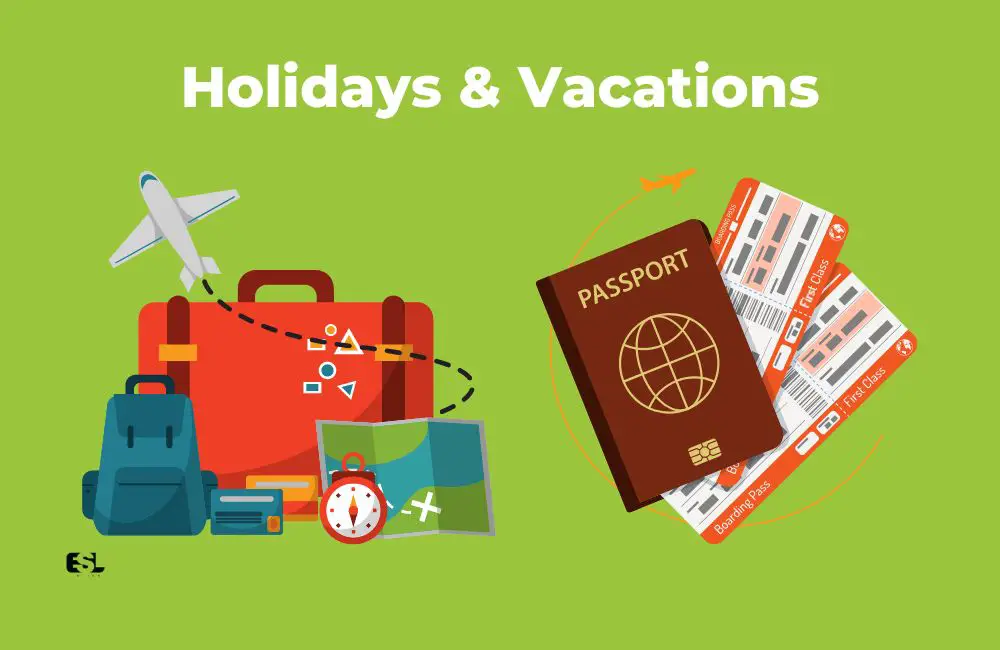
Traveling can be one of our most enriching and exciting experiences, allowing us to discover new cultures, savor unfamiliar cuisines, and form friendships that transcend geographical boundaries. However, language barriers can sometimes hinder our ability to immerse ourselves in these experiences fully. This is why having a robust vocabulary specifically catered towards holidays and vacations is so important.
In this post, we’ll explore several holiday and vacation vocabulary categories, broken down by different aspects of the travel experience.
Table of Contents
1. pre-trip planning, 2. travel and transportation, 3. accommodations, 4. dining and food, 5. sightseeing, 6. emergencies and health, sample conversation: using vocabulary related to holidays & vacations, faq: vocabulary related to holidays & vacations.
Before embarking on a journey, travelers must plan and prepare. This section is dedicated to the vocabulary related to the preparation stage of a vacation.
To improve your vocabulary in just 30 days, I recommend to my students an informative, fun, and accessible guide to utilizing powerful language. Millions of individuals have enhanced their academics, job skills, and confidence by dedicating just fifteen minutes daily to the exercises and tests of 30 Days to a More Powerful Vocabulary (Amazon Link) , a top-selling. It offers step-by-step methods to bolster language prowess, discover compelling words, and daily vocabulary enhancement with pronunciation guidance.
This category encompasses words and phrases related to the different modes of transport that one might use when on holiday or vacation.
From booking a room to talking about hotel amenities, this section will cover vocabulary related to accommodations.
When exploring a new place, the local cuisine can be a highlight of the trip. This section covers vocabulary related to dining and food.
Touring and exploring new locations is a major part of the travel experience. This section provides vocabulary for sightseeing and tour-related activities.
Sometimes, unforeseen circumstances or health issues may arise while on a trip. This section covers vocabulary related to emergencies and health.
Situation: At a coffee shop, two friends, Emma and Jake, are discussing their upcoming holiday plans.
Emma: Jake, I’ve been thinking about taking a getaway to the Maldives. I’ve heard it’s the perfect destination for relaxation and water sports.
Jake: Oh, the Maldives! That sounds like a fantastic choice for a tropical retreat . I’ve seen pictures of their overwater bungalows ; they look so dreamy!
Emma: Yes, I’m looking forward to unwinding there. Plus, I’ve always wanted to experience a sunset cruise and snorkeling in those crystal-clear waters.
Jake: And don’t forget about the local cuisine . Trying new dishes is always a highlight of any excursion . Have you planned your itinerary yet?
Emma: Not yet. I’m considering an all-inclusive resort so I won’t have to worry about meals or activities. But I’ll definitely set aside a day for sightseeing and exploring the local hotspots .
Jake: An all-inclusive sounds convenient. Just remember to check the peak season dates to avoid large crowds. And maybe look into some eco-tours ; they offer a unique perspective on the islands.
Emma: Great advice, Jake! I’ll keep that in mind. This vacation is going to be so rejuvenating!
Armed with the above vocabulary, any travel enthusiast can easily navigate various travel scenarios. Having a good grasp of the terms related to holidays and vacations helps in effective communication and ensures a smoother and more enjoyable travel experience.
So, the next time you plan a vacation, brushing up on your travel vocabulary could be just as important as packing your suitcase. Happy travels!
1. What is a getaway ?
A getaway refers to a short holiday or trip, usually taken to escape from routine and relax.
2. How is a destination different from a hotspot ?
A destination is a place where someone is going or where something is being sent. In travel, it’s the place one plans to visit. A hotspot , on the other hand, is a popular and trendy place, especially where people go for entertainment.
3. What does tropical retreat imply?
A tropical retreat is a vacation or place of relaxation located in a tropical setting, often characterized by warm weather, beaches, and lush vegetation.
4. Why are overwater bungalows popular?
Overwater bungalows offer direct access to the water below and often provide scenic views, privacy, and a luxurious experience, making them highly sought-after accommodations in tropical destinations.
5. How does an all-inclusive resort operate?
An all-inclusive resort offers guests a package deal that typically includes accommodations, meals, drinks, and sometimes even activities, all for a single price.
6. Why is itinerary planning essential?
An itinerary provides a detailed plan or route of a trip. Planning one ensures that travelers make the most of their time, covering major attractions and activities.
7. What are the benefits of eco-tours ?
Eco-tours focus on sustainable travel, ensuring minimal environmental impact. They educate travelers about local ecosystems and cultures, promoting conservation and supporting local communities.
8. What does it mean to unwind on a vacation?
To unwind means to relax and free oneself from stress or worries. On vacation, it’s the act of taking a break from daily routines to rejuvenate.
9. How do peak season dates affect travel plans?
Peak season refers to the busiest times for a travel destination, often due to favorable weather or holidays. While attractions might be livelier, it could also mean higher prices and larger crowds.
10. Why is trying local cuisine recommended when traveling?
Experiencing local cuisine offers a taste of the region’s culture and traditions, making the travel experience more authentic and enriching.
Related Posts

Goodnight vs. Good Night: Which One Is Correct?

Common Adjectives to Describe Someone in English
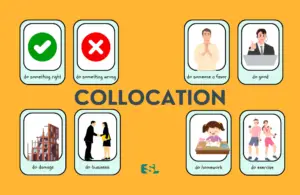
A Guide to Collocations: Combine Words to Enrich Vocabulary
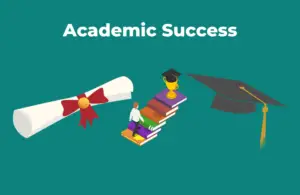
Vocabulary for Academic Success: Key Words and Phrases
Niaj A A Khan
Niaj A A Khan is an ESL Instructor with over 8 years of experience in teaching & developing resources at different universities and institutes. Mr. Khan is also a passionate writer working on his first book, "Learn English at Ease."
Leave a Comment Cancel reply
Save my name, email, and website in this browser for the next time I comment.
📖 Join our community - for free! 📖

“The world is a book and those who do not travel read only one page.” Augustine of Hippo (354 – 430), theologian and philosopher
- April 8, 2021
- General English
Home » Travel
Latest lesson plans

LESSON OVERVIEW
This free ESL lesson plan on travel has been designed for adults and young adults at an intermediate (B1/B2) to advanced (C1/C2) level and should last around 45 to 60 minutes for one student.
Whether it’s exploring new places, or relaxing in familiar ones, everyone loves travelling. In fact, many people learning English are doing so for that exact reason. In the past, travelling to exotic locations was only for the super-rich. Now, with the expansion of budget airlines and cheap packages, the world is a lot more accessible to a lot more people. In this ESL lesson plan on travel, students will have the opportunity to discuss and express their opinions on issues such as how much they like travelling, the best places they have visited and different forms of travel.
This lesson plan could also be used with your students to debate these issues for World Tourism Day , which takes place in September. For more lesson plans on international days and important holidays, see the calendar of world days to plan your classes for these special occasions.
For advice on how to use this English lesson plan and other lesson plans on this site, see the guide for ESL teachers .
PRE-CLASS ACTIVITIES
Reading activity Before the English class, send the following article to the students and ask them to read it while making a list of any new vocabulary or phrases they find (explain any the students don’t understand in the class):
World of Wanderlust | The Top 25 Best Destinations in the World
The article provides descriptions of some of the most visited tourist destinations in the world. At the start of the class, hold a brief discussion about what the students thought about the article. Have the students visited any of these places? If so, what did they think about them? Which of the places on the list would they most like to visit and why? Can they think of any of the destinations that should not be on the list? Which other destinations should be on a list of the best destinations in the world?
Video activity To save time in class for the conversation activities, the English teacher can ask the students to watch the video below and answer the listening questions in Section 3 of the lesson plan at home. There are intermediate listening questions and advanced listening questions so teachers can decide which would be more appropriate for their students. Check the answers in the class.
The video for this class is called “The Point of Travel” by The School of Life which views travel as a kind of therapy that can help us with our emotional state of mind.
IN-CLASS ACTIVITIES
The focus in the class is on conversation in order to help improve students’ fluency and confidence when speaking in English as well as boosting their vocabulary.
This lesson opens with a short discussion about the article the students read before the class. Next, the students can give their opinion on the quote at the beginning of the lesson plan – what they think the quote means and if they agree with it. This is followed by an initial discussion on the topic including the benefits of travel, the student’s favourite holiday/vacation and the best places to spend a holiday/vacation in their country.
After this, students will learn some vocabulary connected with travel such as backpacking , off the beaten path/track and bucket list . This vocabulary has been chosen to boost the students’ knowledge of less common vocabulary that could be useful for preparing for English exams like IELTS or TOEFL. The vocabulary is accompanied by a cloze activity and a speaking activity to test the students’ comprehension of these words. This may also be a good time to explain the difference between travel, trip and journey , as these words are often confused by students
If the students didn’t watch the video before the class, they can watch it after the vocabulary section and answer the listening questions. Before checking the answers, ask the students to give a brief summary of the video and what they thought about the content.
Finally, there is a more in-depth conversation about travel. In this speaking activity, students will talk about issues such as the different types of holiday/vacation people like to go on, how much they like to plan for a trip and the attraction of solo travel.
After the class, students will write about their opinion of travel. This could be a short paragraph or a longer piece of writing depending on what level the student is at. The writing activity is designed to allow students to practise and improve their grammar with the feedback from their teacher. For students who intend to take an international English exam such as IELTS or TOEFL, there is an alternative essay question to practise their essay-writing skills.
DOWNLOAD LESSON PLANS

Did you find this lesson plan useful?
Your English Pal is a free resource to help fellow ESL teachers save time when preparing their classes. If these lesson plans have helped you, and you’d like to help keep the site free, please consider making a small contribution to help cover the site’s costs. Any help you can give is much appreciated!
2 thoughts on “Travel”
Hi I donante 5 dollars I can not download the lesson plan travel c1 c2
Hi Elsa. Thank you very much for your donation! You can download the lesson plan by clicking the PDF images at the bottom of the page (one for teachers and one for students). It should open in the new page and then you can click the download arrow at the top right to save them to your computer. Let me know if that works

Leave a Comment Cancel Reply
Your email address will not be published. Required fields are marked *
Save my name, email, and website in this browser for the next time I comment.
Copyright © 2023 Your English Pal
Privacy Overview

Travel ESL Lesson Plans
- A2 Pre-Intermediate
- B1 Intermediate
- B2 Upper Intermediate
- C1 Advanced
- C2 Proficiency
Lesson times:
- 30 min
- 45 min
- 60 min
- 75 min
- 90 min
Lesson types:
- Free
- Premium
ESL Travel Lesson Plans
If you are looking for an ESL lesson plan on transportation and travel, look no more. You’re in the right place.
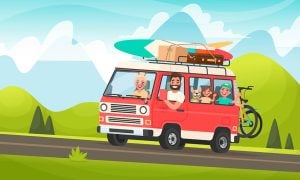
Why we travel
This Upper Intermediate lesson plan focuses on expanding travel vocabulary and…
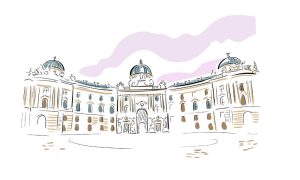
Check out Vienna!
This A2 ESL lesson plan aims to enhance students’ understanding of…

How safe is flying?
This C1 lesson plan focuses on expanding aviation vocabulary …

The geography of small talk
In this Intermediate lesson plan, students will engage in discussions about the nuances…

Chillin’ in Svalbard
In this Upper-Intermediate lesson plan, students will learn about must vs. have to. They will…

If you’re going to San Francisco…
In this Advanced ESL lesson, the students will learn about the culture of…
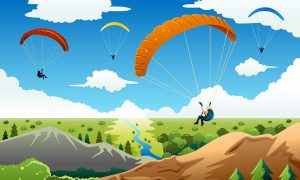
Paragliding to work
In this Intermediate lesson plan, students will talk about the most popular ways…

Exactly where are we now?
In this C2 lesson plan, students will practice vocabulary about travel and international borders. They…

Doing Mardi Gras like a real New Orleanian
In this Advanced ESL lesson, students will talk about a parade and the…

Subscribe to premium content
Here you can find ESL lesson plans on transportation and travel for all difficulty levels, both free and premium.
Our offer – Travel English
We are offering ESL lesson plans for you to use during lessons with your students. Lessons are currently available at A2 and B1 levels , B2, C1 and C2. The duration of each lesson is between 30 and 90 minutes, depending on the plan you choose . This means that you can choose a lesson that suits your students’ level as well as your desired lesson length. The plans are designed to make your job as easy as possible and your teaching as effective as possible. Tired of “forcing” your students to speak? Try our lessons, they guarantee all kinds of discussions between students on topics they actually enjoy, since everyone travels sometimes.
Learn travel vocabulary
Our lesson plans focus on travelling, which gives your students a chance to learn language skills that they will most likely use in their lives. This can also make the lessons interesting – the students can share their experiences with travelling, stories about their travels, share their views on different countries, different cultures and various tourist attractions that they have seen. Lessons include current events, such as traveling during the pandemic, all kinds of situations that may occur at the airport, types of luggage you may bring and much more.
Lessons consist of content that should provoke discussion and prevent students from answering with a simple “yes” or “no”. This will help increase student confidence and also make the teacher’s job easier.
What else to expect
All our ESL Travel lesson plans comprise reading comprehensions, entertaining and inspirational videos, grammar rules and exercises, as well as various forms of discussion related to the topic.
Each week you can expect a new lesson to become available.
Currently we have lessons on travel related topics, such as:
- travelling abroad,
- travelling by planes,
- types of luggage,
- different types of travels and vacations,
- tourist attraction and different tourist destinations,
- life-on-the-road experience.
Our lessons in a few words
You can browse through our lessons to find the ones that suit your needs best. There is an overview for each lesson, so you know exactly what kind of vocabulary you will be teaching and what methods you will use.
Lessons include warm up discussions, videos for your students to watch, reading sections and grammar exercises. All of these elements add up to a complete lesson plan that will ensure your students go home with valuable new skills.
Your browser is not supported
Sorry but it looks as if your browser is out of date. To get the best experience using our site we recommend that you upgrade or switch browsers.
Find a solution
- Skip to main content
- Skip to navigation
- Macmillan English
- Onestopenglish
- Digital Shop

- Back to parent navigation item
- Sample material
- Amazing World of Animals
- Amazing World of Food
- Arts and Crafts
- Mathematics
- Transport and Communication
- Teaching Tools
- Sustainable Development and Global Citizenship
- Support for Teaching Children
- Vocabulary & Phonics
- Spelling Bee Games
- Phonics & Sounds
- The Alphabet
- Onestop Phonics: The Alphabet
- Alphabet Booklet
- Interactive Flashcards
- Warmers & Fillers
- Young Learner Games
- Stories and Poems
- Fillers & Pastimes
- Fun Fillers
- Ready for School!
- Topics & Themes
- Young Learner Topics
- Young Learner Festivals
- Festival Worksheets
- Art and Architecture
- Business and Tourism
- Geography and the Environment
- Information Technology
- Science and Nature
- Topic-based Listening Lessons
- Cambridge English
- Cambridge English: Preliminary (PET)
- Cambridge English: First (FCE)
- Cambridge English: Proficiency (CPE)
- Cambridge English: Advanced (CAE)
- General English
- News Lessons
- Topics and Themes
- Beyond (BrE)
- Beyond: Arts and Media
- Beyond: Knowledge
- Go Beyond (AmE)
- Go Beyond: Arts & Media
- Go Beyond: Knowledge
- Impressions
- Macmillan Readers
- A Time to Travel
- Life & School
- Skills for Problem Solving
- Digital Skills for Teens
- Support for Teaching Teenagers
- Games Teaching Materials
- Business and ESP
- Business Lesson Plans
- Business Skills Bank
- Business Top Trumps
- Elementary Business Lessons
- HR Management
- Business News Lessons
- ESP Lesson Plans
- Career Readiness
- Professional Communication Skills
- Cambridge English: Business (BEC)
- Everyday Life
- Celebrations
- Live from...
- Live from London
- Discussion Cards
- Writing Lesson Plans
- Life Skills
- Support for Teaching Adults
- Vocabulary Lesson Plans
- Language for...
- Vocabulary Teaching Materials
- Macmillan Dictionary Blog
- Vocabulary Infographics
- Kahoot! Quizzes
- Blog Articles
- Professional Development
- Lesson Share
- Methodology: Projects and Activities
- Methodology: Tips for Teachers
- Methodology: The World of ELT
- Advancing Learning
- Online Teaching
- More from navigation items
Topics: How to use the lessons
- 1 Topics: How to use the lessons
- 2 Topics: Business
- 3 Topics: Christmas
- 4 Topics: Crime
- 5 Topics: Easter
- 6 Topics: Environment
- 7 Topics: Family
- 8 Topics: Food
- 9 Topics: Health
- 10 Topics: Hobbies
- 11 Topics: Identity
- 12 Topics: Jobs
- 13 Topics: Love
- 14 Topics: Museums
- 15 Topics: Music
- 16 Topics: Phobias
- 17 Topics: Politics
- 18 Topics: Sport
- 19 Topics: Travel
- 20 Topics: Weather
Topics: Travel
By Adrian Tennant
- No comments
Students are introduced to the topic of travel in this instalment of Adrian Tennant’s Topics series. The lesson is available at two language levels (Pre-intermediate and Intermediate) and gives students practice in reading, listening and speaking skills, as well as exercises focusing on grammar and vocabulary.
Topics: Travel: Pre-intermediate: Lesson plan
Topics: travel: intermediate +: lesson plan, topics: travel (pre-intermediate), topics: travel (intermediate +).
- everyday vocabulary
- Integrated Skills
- Intermediate
- Lesson Plan / Teacher's Notes
- Mixed Ability
- Pre-Intermediate
- Printable Worksheet
- Up to 60 mins
- Up to 90 mins
- Whole Class

Topics: Business

Topics: Christmas
Topics: crime.

Topics: Easter

Topics: Environment

Topics: Family

Topics: Food

Topics: Health

Topics: Hobbies
Topics: identity, topics: jobs.

Topics: Love
Topics: museums, topics: music, topics: phobias, topics: politics.

Topics: Sport

Topics: Weather
Related articles.

Communicative Language Learning: Designing a Travel Itinerary
Get your students talking about fun holiday activities while designing a travel itinerary in teams.

Language for… air travel (how to avoid delays at the airport)
By Tim Bowen
In this lesson, students will learn the necessary vocabulary for checking in for a flight and navigating airport security.
Theme-based expressions: travel
Head out on the open road with Tim Bowen as he introduces some travel-themed expressions.
No comments yet
Only registered users can comment on this article., more from topics.

Introduce your students to the topic of Easter while they practice reading, listening, and speaking.
Use this jolly instalment of Adrian Tennant’s popular series and get your students into the holiday spirit.
Students are introduced to the topic of museums in this instalment of Adrian Tennant’s Topics series. The lesson is available at two language levels (Pre-intermediate and Intermediate +) and gives students practice in reading, listening and speaking skills, as well as exercises focusing on grammar and vocabulary.
LESSON PLAN FOR ENGLISH TEACHERS

Level: Proficiency (C2)
Type of English: General English
Tags: C2 Proficiency (CPE) travel and leisure environment and pollution nature 13-15 years old 16-18 years old 18+ years old Exam preparation Vocabulary and grammar Speaking Article based
Publication date: 06/12/2023
In this lesson, students will have the opportunity to improve their vocabulary and practise tasks that are similar to parts 6 and 7 of the Reading and Use of English exam, as well as part 2 of the Listening exam. The lesson also includes a grammar section about fronting and prefacing and there is a writing task, which can be done either in class or for homework. Strategies for approaching different sections of the exam are explained and there are opportunities for discussion.
by Joey Vaughan-Birch
Be the first to share your thoughts on this lesson
Leave a Comment
Student worksheet
Teacher lesson plan
Save lesson to
In this lesson, students will have the opportunity to improve their vocabulary and practice tasks that are similar to Parts 6 and 7 of the Reading and Use of English exam, as well as Part 2 of the Listening exam. The lesson also includes a grammar section about fronting and prefacing and there is a writing task, which can be done either in class or for homework. Strategies for approaching different sections of the exam are explained and there are opportunities for discussion.
COURSE PLANS
This comprehensive course plan covers the full range of language needs – listening, role play, vocabulary development.
Worksheets in C2 Proficiency (CPE) course plan
Type of English: General English Level: Proficiency (C2)
Make your lessons unforgettable
Did you know that your students can review the target language from our worksheets with our Expemo flashcard app? To let your student know, just enter their email address below (multiple emails can be separated with a comma).
- Search Please fill out this field.
- Manage Your Subscription
- Give a Gift Subscription
- Sweepstakes
- Destinations
- North Carolina
North Carolina's Biggest City Is Home to the Largest Human-made Whitewater River
Here’s how to plan a trip to Charlotte, the largest city in North Carolina.
:max_bytes(150000):strip_icc():format(webp)/LydiaMansel-5ab4b42bbd2845b780ec4494d76f81f7.jpg)
Best Hotels
- Best Things to Do
Best Restaurants
Best shopping, best time to visit, neighborhoods to visit, how to get there, how to get around.
Sean Pavone/Getty Images
If you regularly travel the East Coast, there’s a good chance you’ve had a layover or two in Charlotte. To understand the vibrance and dynamic nature of North Carolina’s most populous city, though, you’ll need to make your way out of the airport terminals and into the neighborhoods that comprise the bustling metropolis and surrounding areas.
“Charlotte has many different cultures, and their influence can be seen and experienced throughout the city,” explains Andres Kaifer, the executive chef and owner of Customshop . From its robust culinary scene — it regularly boasts James Beard Award nominees — to its art galleries, esteemed museums, and appreciation of green spaces and public parks, the Queen City repeatedly proves its role as a financial center is just part of its larger narrative. Yes, Bank of America’s headquarters are located in Uptown Charlotte, but the city is also the home of NASCAR , the Carolina Panthers, and the Charlotte Hornets. As Ashley Creft, co-founder of Charlotte Black-Owned (@ cltblackowned ), shares, Charlotte is “very diverse, and there are lots of opportunities to connect with locally-owned and BIPOC-owned businesses in the city,” many of which you’ll discover below.
Scroll on to read Travel + Leisure ’s guide to Charlotte, North Carolina.
Top 5 Can’t Miss
- Book a five-star stay at The Ritz Carlton, Charlotte, which recently completed a multimillion-dollar renovation.
- Root for the Carolina Panthers, the Charlotte Hornets, Charlotte FC, or the Charlotte Knights while on their home turf.
- Take a tasting tour of some of Charlotte’s best breweries — The Olde Mecklenburg Brewery, Divine Barrel Brewing, and Resident Culture Brewing among them.
- Fill up on Southern fare at Jimmy Pearls.
- Plan your trip in the spring or fall to experience Charlotte’s best weather (and fewer crowds).
The Ritz Carlton, Charlotte
The Ritz Carlton, Charlotte comes recommended by Kaifer, who credits its “easy accessibility to the light rail” and newly renovated wellness amenities as top reasons to book a stay. With a pool, steam room, hot tub, and sauna, the Uptown hotel’s spa is the perfect place to relax after a travel day — or before a big night out in Charlotte.
The Ivey's Hotel
Another Uptown favorite, The Ivey’s Hotel has 47 rooms decorated to give off a “Parisian-style elegance with modern luxury” vibe. In its past life, the building functioned as The Ivey's Department Store (which opened in 1924). Today, it offers guests a range of comfortable rooms and amenities, including a 1,500-square-foot fitness center, the cozy Library Lounge, and a daily complimentary wine social.
The Ballantyne, a Luxury Collection Hotel, Charlotte
Courtesy of The Ballantyne
As the name suggests, The Ballantyne, A Luxury Collection Hotel, Charlotte is located in the upscale Ballantyne neighborhood, 20 minutes south of Uptown. Ideal for travelers who want to be away from the city center (or closer to The Amp Ballantyne ), it’s the type of hotel where you’re more than happy to spend time relaxing on the property — there’s even an outdoor pool, indoor pool, and spa.
Grand Bohemian Hotel Charlotte, Autograph Collection
“For mainstream hotel folks, I think the Grand Bohemian has the most character,” says Corri Smith, owner of Black Wednesday . She shares that its “stellar location in Uptown” is also a plus, but the inside of the property is unexpectedly artistic and bohemian, a contrast from the more buttoned-up look of the neighborhood.
Best Things to Do
Elizabeth W. Kearley/Getty Images
Raft the largest human-made whitewater river in the world.
If everyone in your party is eight years old and above, you can book a guided whitewater rafting experience at the U.S. National Whitewater Center . “The Whitewater Center is incredibly unique and special… [and] it has a wild amount of activities and events,” says Smith — and that includes things to do on dry land. “My favorite things are the Thursday night live music shows ( River Jam ) as well as free outdoor yoga.” According to Kaifer, there’s also the option to “enjoy a nice hike through one of their many trails.”
Explore Charlotte’s art scene.
“Art has become a more honored part of our culture,” says Smith, who recommends checking out a number of local Charlotte artists, including Grace Stott , Kathryn Godwin , Saloan Dunlap , Davita Galloway , and Matt Moore (take a look at their Instagrams or websites to see where their work is on display). Alternatively, travelers can add several of the city’s art museums and galleries to their list; The Bechtler Museum of Modern Art , the Harvey B. Gantt Center for African-American Arts and Culture , and the Mint Museum are some of the most popular. “ Goodyear Arts is a modern art gallery with a residency program that supports under-the-radar artists,” adds Smith.
Sip on some local brews at any one of Charlotte’s numerous breweries.
Like many major U.S. cities, Charlotte has an ever-growing craft beer scene; in fact, the Queen City has more than four dozen breweries to choose from. Once you’ve chosen your designated driver — or booked with City Brew Tours , Trolley Pub Charlotte , or Brew Ha-Ha Tours — visit some of the breweries that catch your eye. Don't know where to start? Stop by Sycamore Brewing , The Olde Mecklenburg Brewery , Birdsong Brewing Co. , Divine Barrel Brewing , and Resident Culture Brewing .
Cheer on Charlotte’s professional sports teams.
When it comes to athletics, Charlotte does it big. Depending on the exact time of year (and how far ahead you’re planning your trip), you might be able to catch a Charlotte Knights baseball game at Truist Field, watch the Carolina Panthers or Charlotte FC play at the Bank of America Stadium, or see the Charlotte Hornets at the Spectrum Center.
Peter Taylor/Restaurant Constance
Restaurant Constance
To narrow down Charlotte’s restaurants to just a handful is tough, but a few specific ones stood out to the Charlotteans we spoke with. Restaurant Constance was one of the first picks from Kaifer: “Chef Sam Diminich does an incredible job of featuring ingredients from local farms and making unique, delicious, and honest food,” he explains.
Jimmy Pearls
Creft has Jimmy Pearls , the only Charlotte restaurant to receive a nomination in the 2024 James Beard Awards, on her list. Chefs Daryl Cooper and Oscar Johnson are the masterminds behind Jimmy Peals, which is described as an “ode to Virginia soul.” Expect menu items like crispy chicken gizzards, fish sandwiches, and fried shrimp — all made, according to the restaurant, to honor “Virginia’s rich history of Black food.”
Uptown Yolk
Not all meals need to be fancy affairs, especially if you’re in the mood for something casual (but equally tasty). For a “delicious” breakfast, Creft suggests Uptown Yolk . It has all of the classics — scrambled eggs, omelets, and pancakes — as well as some “Yolk Way” favorites, like shrimp and grits with smoked gouda and jerk shrimp and the Belgian waffle with chicken wings.
Menya Daruma
“ Menya [Daruma] is some of the most underrated food in the city, in my opinion,” says Kaifer. “The entire menu is delicious, and they have the best fried chicken sandwich in the city.” If the aforementioned Tori Katsu Sando doesn’t call your name, there’s also the ramen and abura soba (or soup-less ramen) dishes.
Customshop
Travelers who like to pair a nice atmosphere with their meal should make a reservation at Customshop , a “chef-driven restaurant” in Midtown. “They recently changed ownership and though the chef-owner, Andres Kaifer, has created a giant impact and switched some things up (for the better), it remains one of the city's most beloved restaurants,” says Smith. “It's a spot where you can rely on the consistency of a delicious, creative, and special meal... It's [also] cozy and romantic and feels like a break from reality.”
Jeffrey Greenberg/Universal Images Group via Getty Images
Travelers with an affinity for high-end designer clothes may already know of Capitol , the legendary luxury boutique founded by Laura Vinroot Poole, as well as its sibling property, Poole Shop . The SouthPark stores are known for their expertly curated inventories — expect to see names such as Saint Laurent, Ulla Johnson, Zimmermann, and Carolina Herrera among the racks.
Along with several large shopping complexes — SouthPark Mall , Atherton Mill and Market , and Phillips Place — Charlotte has a variety of smaller shops, many of which are frequented by Creft and Smith. “I love stopping by 704 Shop to pick up Charlotte paraphernalia and [The] Brown Sugar Collab to shop products by BIPOC women suppliers,” says Creft. To add to your plant collection, head to Oakdale Greenhouses . “The owner, Bill, is a plant expert and is on-call for plant emergencies and education or tips. It's a family-run shop that is super welcoming,” says Smith. She also adds she regularly visits “ The Jungle [for] gifts and home decor, Boris and Natasha [for] clothing and accessories, and Paper Skyscraper [for] gifts.”
For a slightly different shopping experience, keep an eye out for pop-ups. “I also do a lot of shopping during pop-up events which are often held at Camp North End or other industrial venues or warehouses,” says Smith. “ VTGCLT happens a few times a year and is a cool way to learn about new and fresh vendors and to scoop up unique antiques/pieces.”
JillLang/Getty Images
“Spring and fall are the prettiest seasons in Charlotte,” says Kaifer, who shares that the weather this time of year is “almost always perfect.” Smith agrees, noting that Charlotte has a “very short spring,” but travelers should aim to visit in April, October, or early November. The shoulder seasons also give way to quite a few festivals and sporting events. In the spring, mark your calendar for the Wells Fargo Championship , Charlotte Wine and Food Week , and the Coca-Cola 600 . Autumn festivities include the Charlotte International Arts Festival , Charlotte Craft Beer Week , and the Festival in the Park .
Skyhobo/Getty Images
If you’re searching for the city center, or the “downtown,” you’ll need to make your way to Uptown Charlotte. Here, you’ll find the central business district, as well as a plethora of museums and sporting areas. The Bechtler Museum of Modern Art, the Harvey B. Gantt Center for African-American Arts and Culture, and the Mint Museum are all located in the neighborhood, as are the Bank of America Stadium, the Spectrum Center, and Truist Field. Uptown Charlotte is also broken down into four wards — within the Second Ward, you’ll find the area that was once known as Brooklyn , which Creft recommends for travelers looking “to learn more about the history of the predominantly Black community that thrived there many years ago.”
Smith adds NoDa, short for North Davidson, to her list of must-experience Charlotte neighborhoods. The city’s arts and entertainment district, NoDa has a wide range of sights and activities to keep you busy. Embark on a self-guided street art tour to see the area’s impressive murals, pop in and out of vintage shops, or check the schedules at Neighborhood Theatre or The Evening Muse to see if any live performances strike your fancy.
Plaza Midwood
Both Kaifer and Smith share their affinity for Plaza Midwood. Similarly to the NoDa neighborhood, Kaifer says it has a “great variety of retail and great restaurants, and [it’s] also nice to walk around in.” The pedestrian-friendly area is populated with historic homes, consignment shops, boutiques, breweries, and Veterans Park , where you can explore 19 acres of trails, green space, and more.
Camp North End
Camp North End is technically billed as a “creative hub” versus a full neighborhood, but the 76-acre campus — which once served as Charlotte’s first Ford Motor Company factory — is filled with interesting tenants with stories to tell. “There is a local coffee and [natural] wines shop ( Hex ), a record store ( Hardy Boys Records ), a dairy-free ice cream shop ( Seemingly Overzealous ), a salon ( Explicit ), artist studios, shops , a charcuterie bar , and more,” says Smith.
Charlotte Douglas International Airport (CLT) is one of the busiest airports in the country. An American Airlines hub, it’s also served by seven other major airlines — including Delta, Southwest, JetBlue, and United — and offers flights to 180 destinations around the world. Uber or Lyft are readily available at the airport, but travelers can also opt to use the CATS (Charlotte Area Transit System) Sprinter Service . The bus provides rides (which take anywhere from 25 to 35 minutes) between CLT and Uptown Charlotte, and one-way tickets cost $2.20.
espiegle/Getty Images
Charlotte is the largest city in North Carolina, and a car is necessary if you’re going to explore beyond Uptown. Still, there are a few other ways to get around the city center. The LYNX Blue Line light rail line serves 26 stations, and its routes span over 20 miles. One-way, one-day, seven-day, and round-trip tickets can be purchased through the self-service ticket vending machines at the stations or via the CATS-Pass app . If you prefer to tour the city on two wheels, hop on a Charlotte Joy Rides e-bike. A Flash Pass grants you a 30-minute membership for $5, and a $30 Joy Pass gives you bike access for 24 hours.
I've traveled to 9 out of 10 countries in Southeast Asia. Here are the 5 biggest mistakes I made along the way.
- I've traveled solo to nine countries in Southeast Asia.
- I've made many mistakes, from traveling during monsoon season to forgetting to bring enough cash.
- Travelers should make sure they plan ahead and research each country's culture.

Over the last two years, my journey as a travel enthusiast and Business Insider's travel reporter in Singapore has brought me to almost every country in Southeast Asia.
In total, there are 10 countries in Southeast Asia , and I've traveled to nine of them — Singapore, Philippines, Malaysia, Vietnam, Thailand, Indonesia, Cambodia, Laos, and Brunei. Myanmar remains the only country in the region I have not visited, and while I am keen to explore it, I have held off on visiting because of the country's ongoing civil war.
I've watched the sun rise in Angkor Wat in Cambodia and cared for elephants in Chiang Mai, Thailand. I've explored the Bornean jungle in Brunei and crawled the Cu Chi Tunnels in southern Vietnam.
But it hasn't always been easy. I've made several mistakes traveling across the region , especially as a solo traveler. Here are five mistakes I made and how to avoid them.
1. Going during monsoon season and not planning for the weather.
In July, I traveled to Thailand on a reporting trip to cover the budding cannabis industry . There, I was met with heavy rain nearly every day. In Bangkok, I was staying in a hostel in Chakkrawat , a district with narrow, meandering streets, which made it difficult to walk anywhere in the pouring rain.
I didn't plan for the weather, so I didn't have an umbrella or poncho with me and had to rush to get one at the last minute. I also had a packed itinerary with a lot of travel between meetings, which was a hassle in the constant downpour.
Before traveling to Southeast Asia, make sure to avoid two seasons — the monsoon season, which often comes with strong typhoons in countries like the Philippines, and the burning season, where farmers burn land for fertile soil. This is a common occurrence in countries like Laos, Thailand, and the island of Borneo, which is shared between Brunei, Indonesia, and Malaysia.
When I traveled to Laos in April last year during the burning season , most of my plans — including a hot air balloon ride — were canceled because of the thick smog. I also didn't have an N95 mask with me, and I ended up with a sore throat.
If you do plan to come during these seasons, make sure to pack accordingly and plan a flexible schedule.
2. Traveling during Ramadan and expecting the same practices everywhere.
Having grown up in Singapore, I'm familiar with the practices during Ramadan , the holy month for Muslims, where they fast for most of the day. I studied Malay for seven years, and in school, I often fasted with my Muslim classmates and ate only in private.
Still, in many cities in Singapore, Malaysia, and Indonesia , non-Muslims are free to dine in public, so long as they do so respectfully. But on my trip to Brunei in April — at the height of the burning season and in the middle of Ramadan — there were more practices I needed to observe.
Most restaurants were closed, and diners weren't allowed to eat there even if they were open — only take-out was allowed. Eating in public was a major faux pas even for non-Muslims, and if you want to drink some water, you can only do so when nobody is around.
It wasn't easy, especially as Brunei was sweltering at 100 degrees Fahrenheit on some days. I made do by returning to the hotel for lunch and grabbing a big dinner with the locals at the night market after they had broken their fast.
3. Not packing enough modest outfits when visiting temples and mosques.
Southeast Asia is pretty liberal, and you can wear whatever you want in many places. In popular destinations like Phuket, Thailand, and Bali, Indonesia, lots of tourists walk around in bikini tops and shorts, and locals mostly tolerate it.
But there are certain places you do need to cover up, like places of worship, which include temples and mosques. When I visited Angkor Wat — the famed temple complex in Cambodia — in February last year, I found some tourists being told off by the local tour guides for wearing shorts and tank tops — "Tomb Raider" style.
I've learned to err on the right side of caution and bring a sarong wherever I go. It's an easy way to cover up and make an outfit more modest when you need to.
4. Forgetting to pack medication, especially when I plan to eat street food.
Southeast Asia has some of the world's most flavorful food. In every country, you can find food that is cheap and delicious, and that includes Singapore , the world's most expensive city. In countries like Malaysia and Vietnam, street food dishes can cost as little as a dollar.
I eat mostly street food when I travel in Southeast Asia, so medicine for tummy-related illnesses is a must. I've only gotten sick twice from eating street food — and it was the same dish both times— and unfortunately, those were the few times I didn't have medicine with me.
I'm a pretty adventurous eater. I've eaten everything from pufferfish stew to frog porridge and dishes made with intestines off the street. I've learned to wash the utensils provided before digging in and make sure the food is cooked to order and heated up before being served.
5. Relying on my card and not bringing enough cash with me.
In Singapore, I don't really use cash and often use Apple Pay, mobile payments, and cards. But I've found that many stores in other countries in Southeast Asia only accept cash.
For example, on my third trip to Vietnam, I spent an hour trying to make payment via bank transfer after the staff at a luxury perfume shop — which was selling items priced upwards of $200 — informed me at the last minute that they didn't accept card or contactless payment.
I've also found the majority of street vendors in the region only accept mobile payment — which is limited to local banks — or cash. I've learned to change a considerable amount of money before leaving the airport and keep whatever I didn't use for my next trip.
- Main content
- Skip to main content
- Keyboard shortcuts for audio player

- LISTEN & FOLLOW
- Apple Podcasts
- Google Podcasts
- Amazon Music
Your support helps make our show possible and unlocks access to our sponsor-free feed.
The April Solar Eclipse Means Business

In this photo illustration, eclipse glasses from Warby Parker are seen on a table in New York City. Michael M. Santiago/Getty Images hide caption
In this photo illustration, eclipse glasses from Warby Parker are seen on a table in New York City.
If you're just now planning travel for next week's total solar eclipse, you may be a little behind.
Hotels are booked up and campgrounds are sold out in and around towns in the eclipse's path of totality. Nearly 4 million people are expected to make the trip to the viewing zone which stretches from Maine to Texas.
Emergency preparations are underway in anticipation of the surge in travel. But planning for the worst has been accompanied by a spending boom in affected areas. Local businesses are taking advantage of the extra foot traffic, from hosting watch parties to rolling out solar eclipse-themed menus. According to an estimate from The Perryman Group, Texas alone could rake in $428 million in eclipse-related spending.
How are cities and local businesses preparing for the spending boom? And what should you do to prepare if you plan on traveling to see the solar event? Find more of our programs online. Listen to 1A sponsor-free by signing up for 1A+ at plus.npr.org/the1a .
We've detected unusual activity from your computer network
To continue, please click the box below to let us know you're not a robot.
Why did this happen?
Please make sure your browser supports JavaScript and cookies and that you are not blocking them from loading. For more information you can review our Terms of Service and Cookie Policy .
For inquiries related to this message please contact our support team and provide the reference ID below.
BREAKING: Ex-Trump CFO Allen Weisselberg sentenced to 5 months for perjury in former president's civil fraud trial
Biden announces plans to address Baltimore port closure and help workers after deadly bridge collapse
After visiting the site of the deadly Francis Scott Key Bridge collapse on Friday, President Joe Biden said that his administration is taking swift action to try to ease the disruption at Baltimore's port and help workers and small businesses affected by the port closure.
After an aerial tour of the site, Biden said that the federal government will provide more than $8 million in grant funds to make infrastructure improvements to the port at Baltimore's Sparrows Point — an area unaffected by the bridge collapse — so it can take on more ships.
The president also announced that his administration would provide grants to workers affected by the pause in port operations and said the Small Business Administration would offer low-interest loans for small businesses impacted by the incident last week.
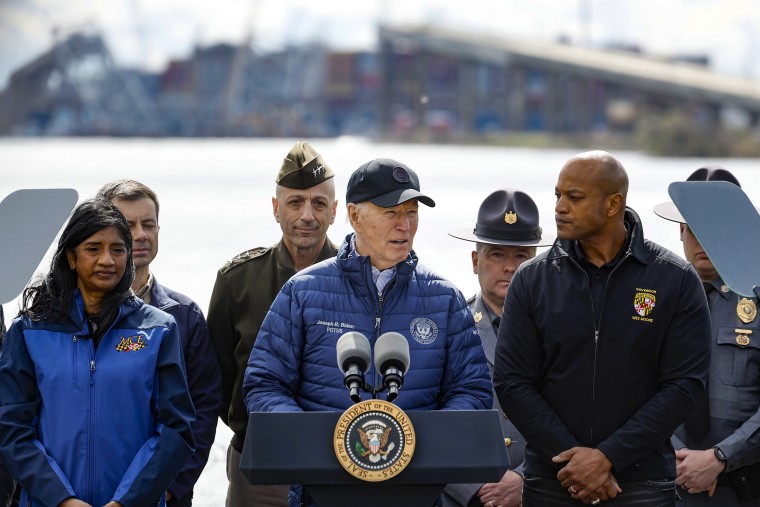
"I’m here to say your nation has your back," Biden said. "The damage is devastating and our hearts are still breaking," he continued, noting that six workers who were fixing potholes on the bridge lost their lives.
"I’ve come here to grieve with you," he said, flanked by Transportation Secretary Pete Buttigieg, Maryland Gov. Wes Moore and other Maryland and Baltimore officials. "It’s not the same, but I know a little bit about what it’s like to lose a piece of your soul."
Biden reiterated that he wants Congress to pass funding to cover the entire cost of constructing a new bridge. He also said that, so far, two small channels have been cleared for ships helping to clear the wreckage and noted the tentative timeline for reopening the port announced Thursday by the Army Corps of Engineers.
The Army Corps of Engineers expects “to open a limited access channel for barge container service and some vessels that move automobiles and farm equipment by the end of April” and “restore the port to normal capacity by the end of May,” the White House said.
In addition to the aerial tour, Biden received an operational update on response efforts from the Coast Guard and Army Corps of Engineers and was expected to meet personally with the families of the six workers who died.
The Francis Scott Key Bridge collapsed early on the morning of March 26 when a cargo ship crashed into a support pillar. The remains of two people who were killed have been recovered, four others are presumed dead and two people who fell into the water survived.
Biden addressed the disaster during remarks in the hours following the collapse, saying that the White House would send “all the federal resources they need” and that they would rebuild the port. He also said that he intended for the federal government to pay the entire cost of reconstructing the bridge.
Director of the Office of Management and Budget Shalanda Young sent a letter to congressional leaders on Friday asking them to authorize "a 100 percent Federal cost share for rebuilding the bridge."
“To the people of Baltimore, I want to say: We’re with you. We’re going to stay with you as long as takes. And like [Moore] said, you’re Maryland tough, you’re Baltimore strong, and we’re going to get through this together,” Biden said during his remarks last week. “And I promise: We’re not leaving.”

The National Economic Council has also convened the administration's Supply Chain Disruptions Task Force to coordinate federal efforts to support affected industries in the aftermath of the collapse, the White House announced last week.
“We are much better equipped to mitigate supply chain disruptions than we were just a few years ago, thanks to increased coordination across the supply chain and new efforts to strengthen both our physical and digital infrastructure,” Buttigieg said in a statement.
Also last week, the Department of Transportation announced $60 million in emergency relief funds to go toward rebuilding the bridge. The White House said it would serve as a "down payment" for initial costs.
In 2023, the Baltimore port near the bridge, a key shipping hub and source of jobs, “handled a record 52.3 million tons of foreign cargo, worth $80 billion,” Moore announced in February. The port also generated more than 15,000 direct jobs, “with nearly 140,000 jobs linked to port activities,” he said in the statement.
Megan Lebowitz is a politics reporter for NBC News.
Rebecca Shabad is a politics reporter for NBC News based in Washington.

IMAGES
VIDEO
COMMENTS
Travel English: Vocabulary, phrases & expressions for traveling. Travel English: Vocabulary, phrases & expressions for traveling. Knowing some English phrases can make your trip safer and more fun, even if you're not traveling to a place where English is the official language! ... No thanks, I have lots of plans.
Air Travel Vocabulary and Sample Sentences. Airport: I went to the airport to catch a flight to San Francisco. Check in: Make sure to get to the airport two hours early to check in. Fly: I like to fly on the same airline to get mileage points. Land: The airplane will land in two hours. Landing: The landing took place during a storm.
Recommended for you: Spa Fitness Gym Workout Massage Vocabulary and Dialogs Formal and Informal Email Phrases Starting with Greetings NEXT: Packing Vocabulary. Packing. Suitcase: a case with a handle and hinged lid, used for carrying clothes and other personal possessions. Backpack (US), Rucksack (UK): a bag with shoulder straps that allow it to be carried on one's back.
Wrapping Up Our English Travel Vocabulary Journey. And there you have it! We've journeyed through 40 essential English words and phrases that will help make your travels smoother and more enjoyable. Remember, language is a powerful tool that can open doors to understanding new cultures, making new friends, and creating unforgettable ...
We have included useful words related to using trains, buses, cars, taxis, planes and boats, so you can have your travel phrases covered, whatever your mode of transport. General English Travel Vocabulary: to arrive, to depart, to leave, to stay, to cancel, cancellation, cancelled, delay, delayed. to book, to reserve, reservation, to cancel a ...
Gate. A gate is where you will enter to get to the airplane. It is also the place where you wait before boarding your flight. The gate is usually written on your boarding pass. Restroom. A restroom is a place where you take care of personal business like combing your hair, washing your face or using the toilet.
Study with Quizlet and memorize flashcards containing terms like extracurricular activities, take a flight, a platform and more.
In this lesson, Ill teach you the English vocabulary you must know for travel -- from preparing your travel itinerary and making reservations, to getting your visas and boarding your flight. It is essential that you know this basic English travel vocabulary, because English is an international language. ESL students who are studying abroad will ...
Travel English. Int. Teens & Adults. In this lesson, Ellen and Martin Baxter make travel plans. Students listen to the couple's conversation and practice it. The lesson includes a vocabulary and comprehension check. Launch Tasks.
Pro tip: we have packed a ton of information into this article, but you'd get more if you book lessons with a dedicated professional teacher at italki. italki doesn't function like other learning applications. It doesn't have pre-prepared lessons, quizzes, or games. Learners can send their learning guidelines to a chosen instructor. italki English tutors create personalized study plans ...
Match the English travel vocabulary to their definitions. Travel vocabulary. 1. don't want to be rushed 2. all-inclusive holiday 3. tourist in your own town 4. clear your mind 5. connect with nature 6. hustle and bustle 7. touristy 8. artificial. Definition. A. When you spend time outdoors B. When a place is very busy and noisy C.
A fun way to teach vocabulary and expressions to talk about travel plans using the future simple. Get the listening transcripts and lesson activities here: h...
Updated on May 30, 2019. This English lesson plan helps reinforce vocabulary related to traveling by asking students to plan trips and excursions based on the profile of different groups of travelers. It is helpful to use local newspapers, especially newspapers that provide local events, to give students ideas of real places to visit.
FAQ: Vocabulary Related to Holidays & Vacations. 1. Pre-trip Planning. Before embarking on a journey, travelers must plan and prepare. This section is dedicated to the vocabulary related to the preparation stage of a vacation. Word/Phrase. Meaning/Usage. Example Sentences. Itinerary.
9. How do you typically go about planning a vacation? 10. Do you prefer to plan your vacations well in advance or do you like to be spontaneous? Why? 11. How do you decide which attractions or activities to include in your itinerary? 12. Have you ever had to deal with unexpected changes or challenges during a vacation?
LESSON OVERVIEW. This free ESL lesson plan on travel has been designed for adults and young adults at an intermediate (B1/B2) to advanced (C1/C2) level and should last around 45 to 60 minutes for one student. Whether it's exploring new places, or relaxing in familiar ones, everyone loves travelling.
travel plan: 1 n a proposed route of travel Synonyms: itinerary Type of: plan of action a plan for actively doing something
Browse Our ESL Lesson Plans on Travel. These ESL lesson plans focus on practical vocabulary and conversation questions centered around unique travel experiences and destinations, from the lost city of Colombia to the bustling markets of Thailand. These materials are designed for adult English learners who love to explore the world and learn about new cultures.
Travel. 609 Travel English ESL worksheets pdf & doc. SORT BY. Most popular. TIME PERIOD. All-time. PhilipR. Let´s talk about TRA. This worksheet conta. 118721 uses. ... Vocabulary and gramm. 37540 uses. Arianey. Phrasal Verbs relate. A worksheet and ques. 35932 uses. LiliyaB. A Sightseeing Holida. This (amended) gap f. 35846 uses.
Our offer - Travel English. We are offering ESL lesson plans for you to use during lessons with your students. Lessons are currently available at A2 and B1 levels, B2, C1 and C2. The duration of each lesson is between 30 and 90 minutes, depending on the plan you choose. This means that you can choose a lesson that suits your students' level ...
Topics: Travel. Students are introduced to the topic of travel in this instalment of Adrian Tennant's Topics series. The lesson is available at two language levels (Pre-intermediate and Intermediate) and gives students practice in reading, listening and speaking skills, as well as exercises focusing on grammar and vocabulary.
This lesson is based on information from the English Heritage and Natural England websites. Students will learn factual information about England's, tourism, politics and history. Exercises will test students' listening and reading skills and the language point will give students practice in asking for information during a trip to England.
Travel. In this lesson, students will have the opportunity to improve their vocabulary and practise tasks that are similar to parts 6 and 7 of the Reading and Use of English exam, as well as part 2 of the Listening exam. The lesson also includes a grammar section about fronting and prefacing and there is a writing task, which can be done either ...
Plan your trip in the spring or fall to experience Charlotte's best weather (and fewer crowds). 8 Best Places to Live in North Carolina — From Big Cities to Small Towns Best Hotels
Global escapes pricing is offered on flights in Economy & Premium Economy class only. Travel has to originate in the US. Promo is valid on bookings April 3, 2024-April 30, 2024 for travel on September 1, 2024-November 30, 2024. Each award is subject to taxes and carrier-imposed fees starting from $5.60 per person, each way.
5. Relying on my card and not bringing enough cash with me. The Café Apartments in Ho Chi Minh City, Vietnam. Marielle Descalsota/Business Insider. In Singapore, I don't really use cash and often ...
If you're just now planning travel for next week's total solar eclipse, you may be a little behind.Hotels are booked up and campgrounds are sold out in and around towns in the eclipse's path of ...
April 9, 2024 at 6:51 AM PDT. Listen. 2:11. Trouble for Air India Ltd. is mounting with aircraft technicians planning a strike later this month after its pilots voiced concerns last week about ...
April 10, 2024 at 4:36 AM PDT. Listen. 1:37. A Japanese astronaut will be the first non-American to travel on a NASA lunar mission, the US and Japan plan to announce on Wednesday, according to a ...
President Joe Biden is traveling to Baltimore to visit the site of the deadly Francis Scott Key Bridge collapse, which left six presumed dead and is expected to have a major impact on the port's ...